SOC 10500: Individual, Group and Society: An Introduction to Sociology (3 Credits)
M&W 9:30-10:45am, Erela Portugaly, PhD
M&W 2:00-3:15pm, Prof. Gwendolyn Dordick
T&Th 9:30-10:45am, Jennifer Sloan
T&Th 5:00-6:15pm, Talha Issevenler, PhD
Fri. 9:00-11:30am, Edward Silver, PhD
Fri. 12:00-2:30pm, Colin Ashley
**Sections are IN-PERSON, Zero Textbook Costs**
The language of sociology, the sociological perspective, and basic areas of sociological inquiry. Topics include: culture, socialization, self and society, social stratification and social class, the family, religion, policy, community organization, collective behavior, mass culture, social order and social change.
This course fulfills a general education requirement and is REQUIRED for Sociology majors and minors.
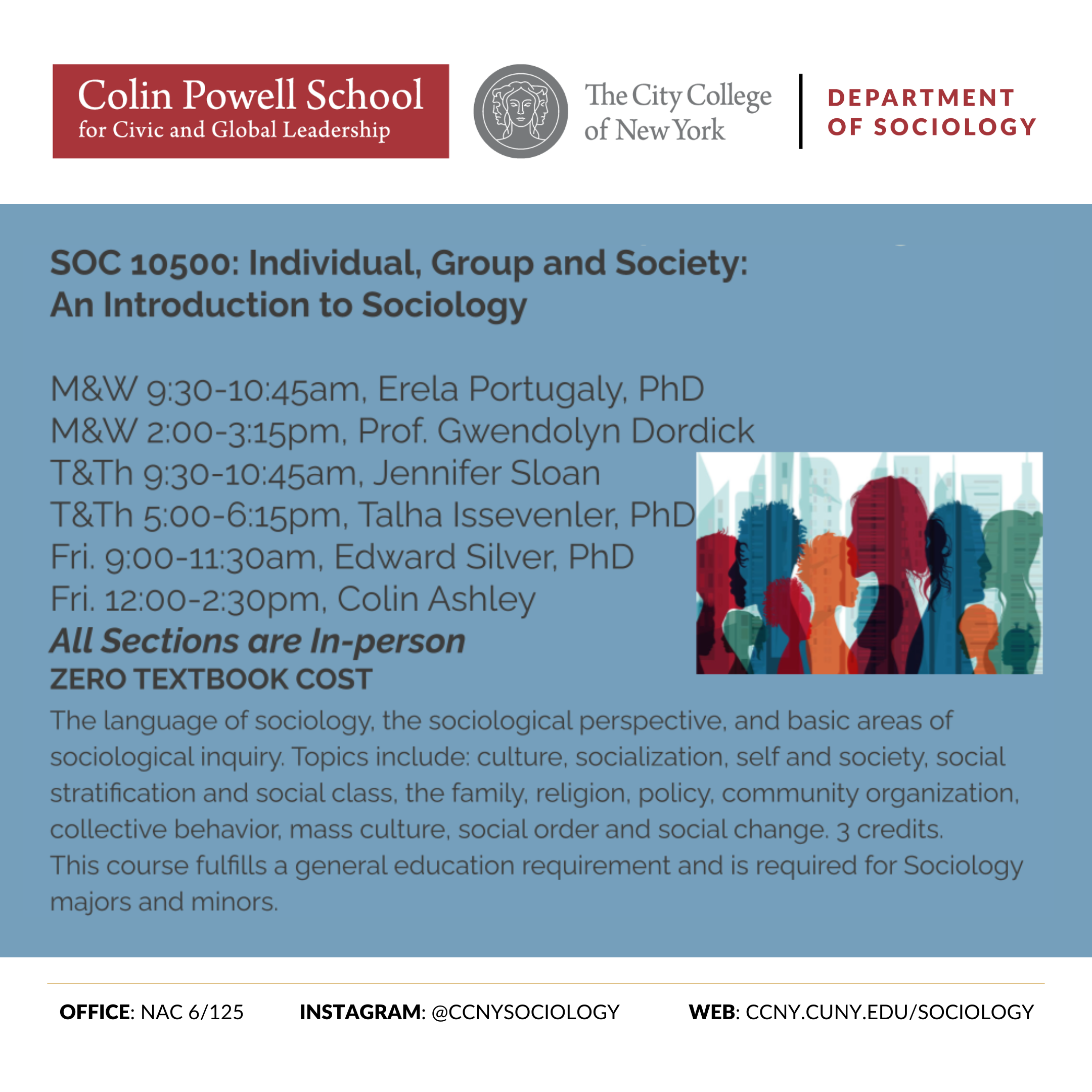
SOC 23100: Sociological Statistics (3 Credits)
T&Th 6:30-7:45pm
IN-PERSON
Instructor: Sandy Tak, PhD.
An introduction to statistical theory and techniques as utilized by sociologists. This course covers descriptive and inferential statistics.
Prerequisite: SOC 105 (can be taken concurrently with SOC 105)
Credit given for only one of the following courses: SSC 31100, SOC 23100, ECO 20150, PSY 21500.
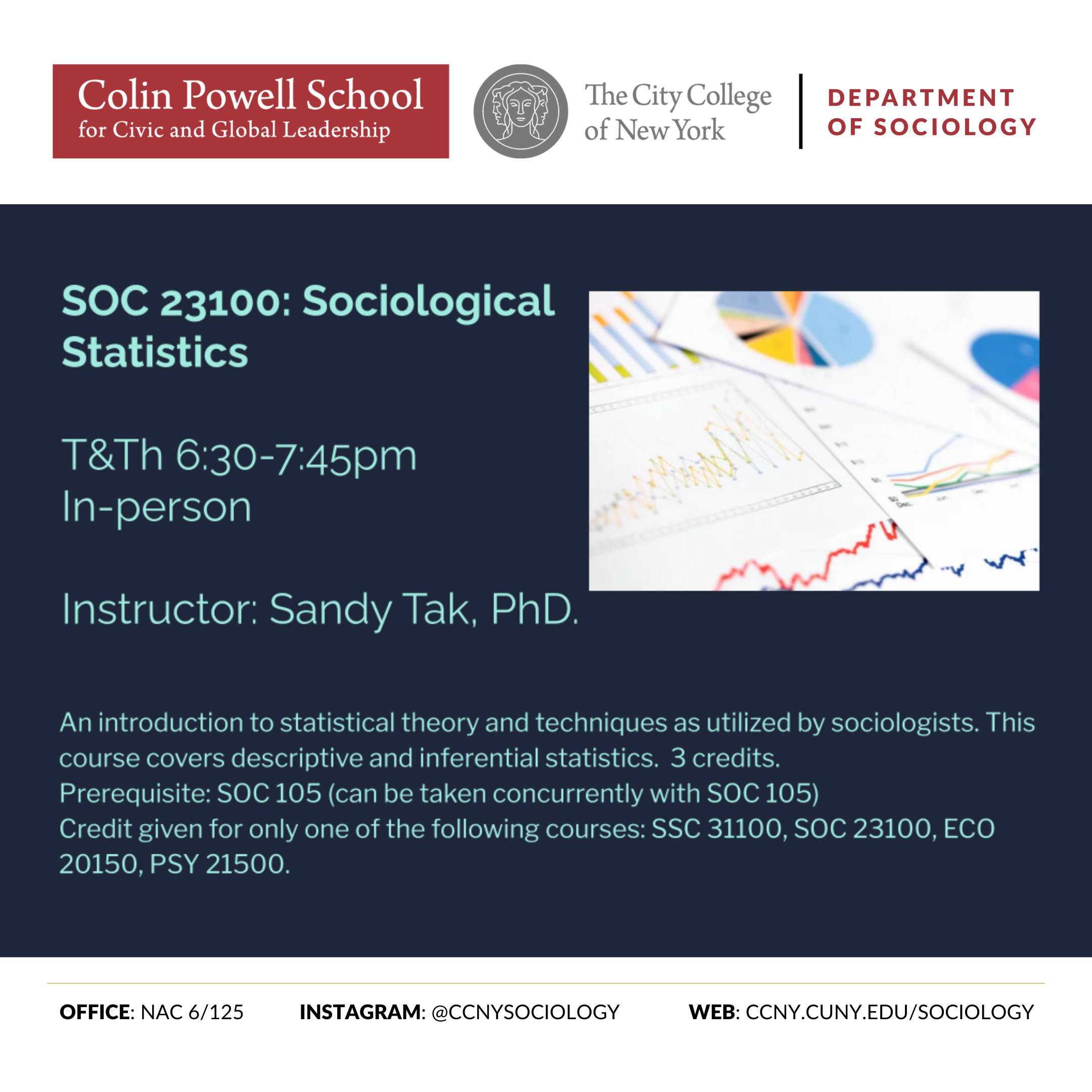
SOC 23200: Methods and Techniques of Sociological Research (4 Credits)
M&W 11:00am-12:15pm
Hybrid & Asynchronous
Instructor: Justin Beauchamp
T&Th 2:00-3:15pm
Hybrid & Asynchronous
Instructor: Larry Au
**Zero Textbook Costs**
The meaning and relevance of "the Scientific Method" as a canon guiding the logic of research in sociology. Historical perspective and method of social research in the recent past. Survey research, sampling, questionnaire construction analysis, and hypothesis- testing; community study, field observation, unstructured interviewing, participant observation, control of bias.
This 4-credit course requires additional work outside of class, including flipped lectures, readings, and assignments. This course is required for all sociology majors.
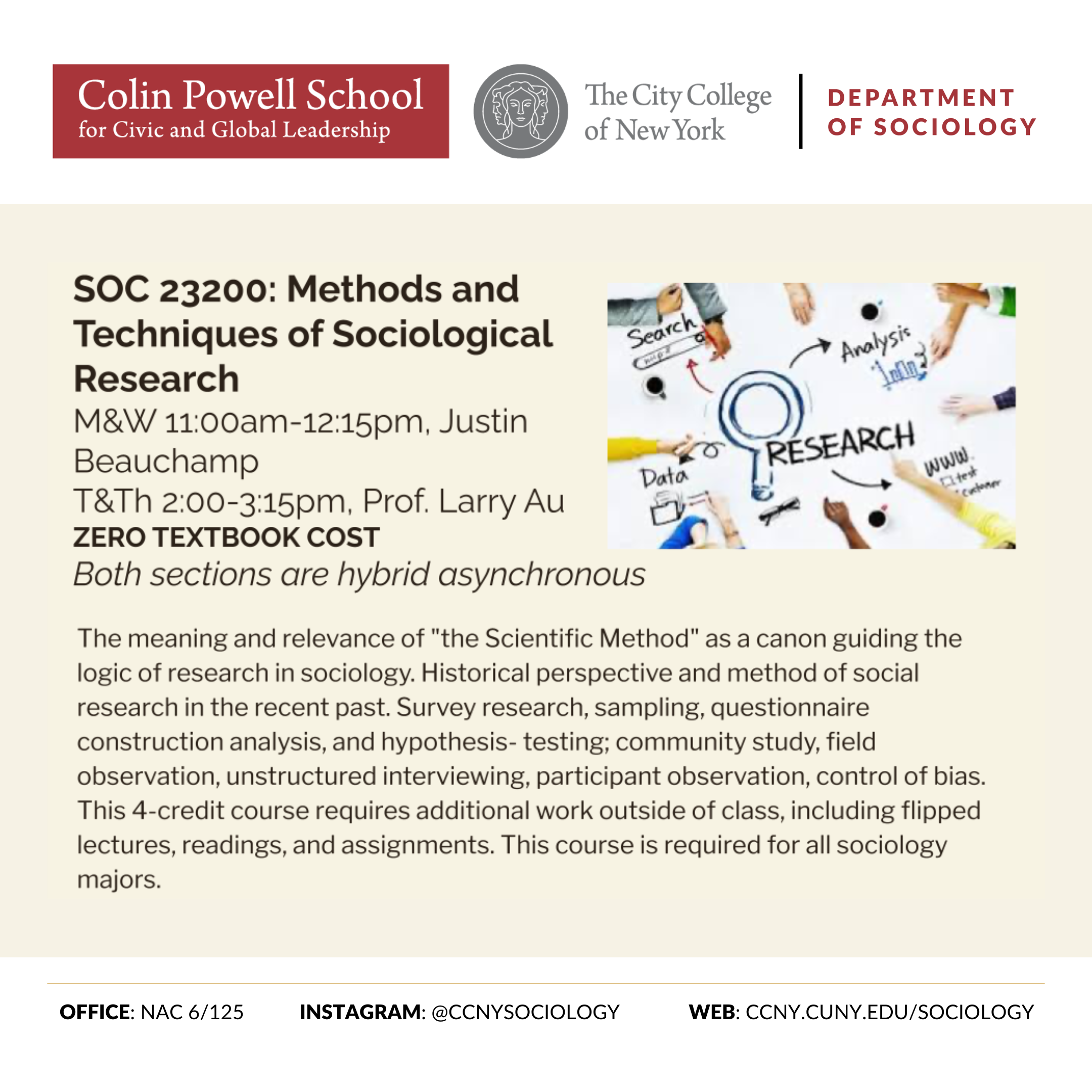
SOC 23700: Foundations of Sociological Theory (4 Credits)
M&W 6:30-7:45pm,
Instructor: Chang Liu
T&Th 11:00am-12:15pm,
Instructor: Maritsa Poros
Both sections are hybrid asynchronous
**ZERO TEXTBOOK COST + LOW TEXTBOOK COST**
The roots of modern sociology in the ideas of nineteenth and early twentieth century theorists, such as Marx, Weber, Durkheim, Simmel, Veblen and Cooley, with emphasis on the intellectual and social context and current relevance of the concepts and propositions they developed.
This 4-credit course requires additional work outside of class, including flipped lectures, readings, and assignments. This course is REQUIRED for all sociology majors.
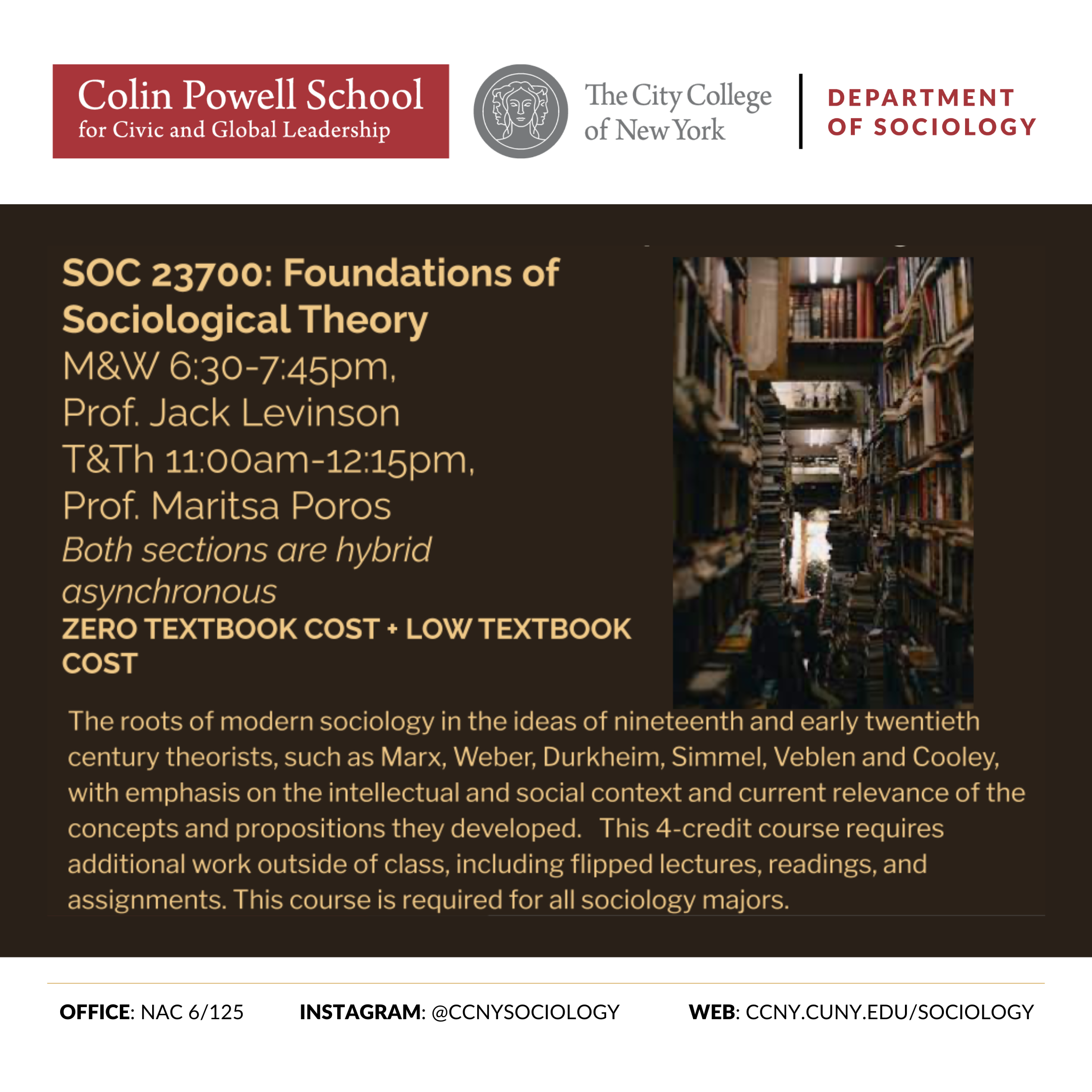
SOC 26800: Mass Movements (3 Credits)
M&W 11:00am-12:15pm
IN-PERSON
Instructor: Ekim Kilic
This course delves into the social forces that drive the formation and evolution of mass movements, with particular attention to both reformist and revolutionary trajectories. Why are reform movements limited in achieving their agendas without resorting to conflicting tactics? Why and how did the political horizons of national revolutions lose their grip after the revolution? Why do people gather around their demands and struggle for their lives politically? To what extent do socioeconomic class and aspects of social existence determine the ideological perspectives of mass movements? Through the lenses of sociology, political science, and history, students will analyze various theoretical frameworks and apply them to contemporary case studies.
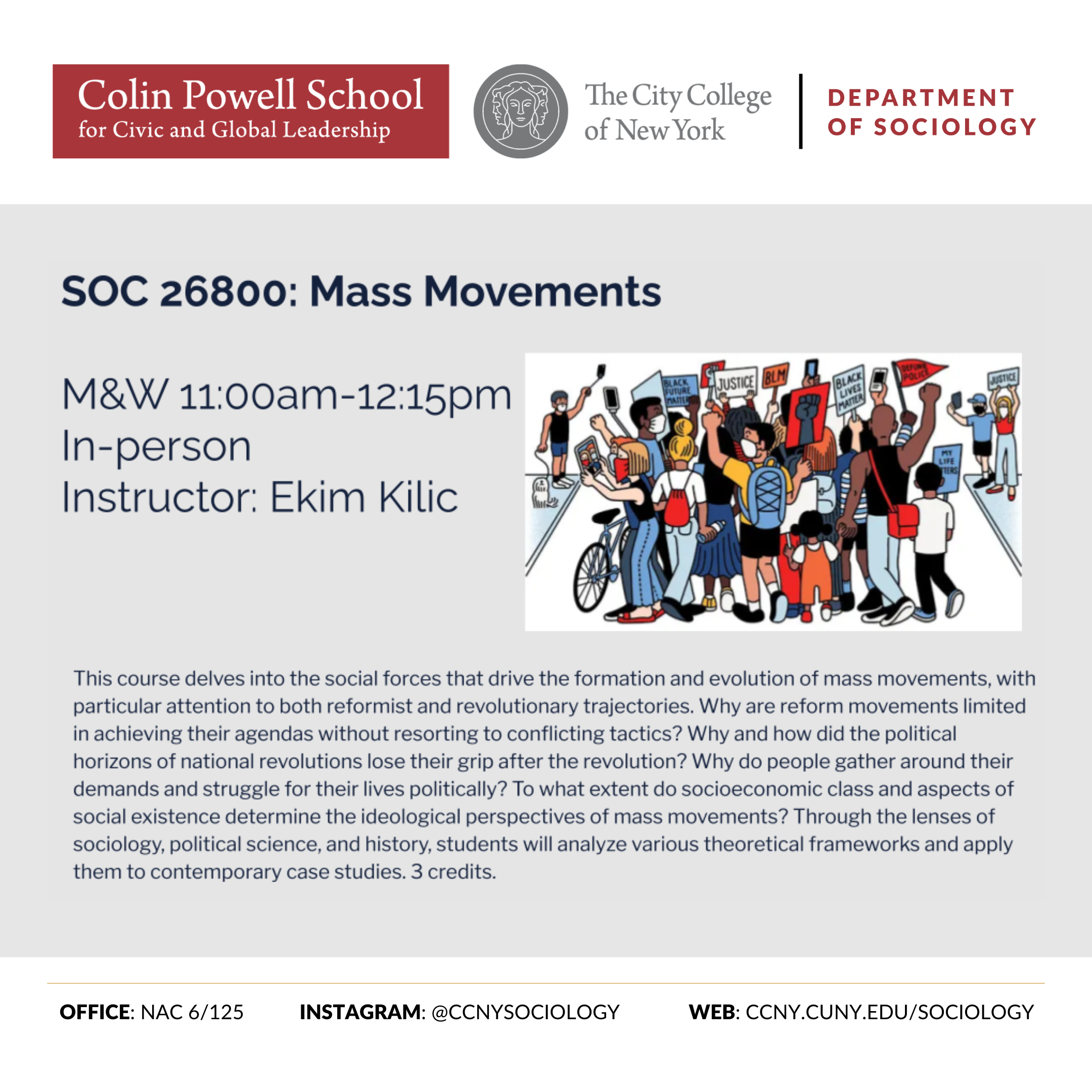
SOC 27000: Sociology of Health and Illness (3 Credits)
M&W 3:30-4:45pm
In-person
Instructor: Elise Li Zheng
**ZERO TEXTBOOK COSTS**
This course examines health, illness, disability, and medicine from a social perspective. Topics may include: epidemiology, historical transitions in population health, social and cultural analysis of health and disease, medicine as profession and work practice, health policy, and the nature and role of health-related knowledge in professional and popular contexts.
This course counts towards the new health justice minor.
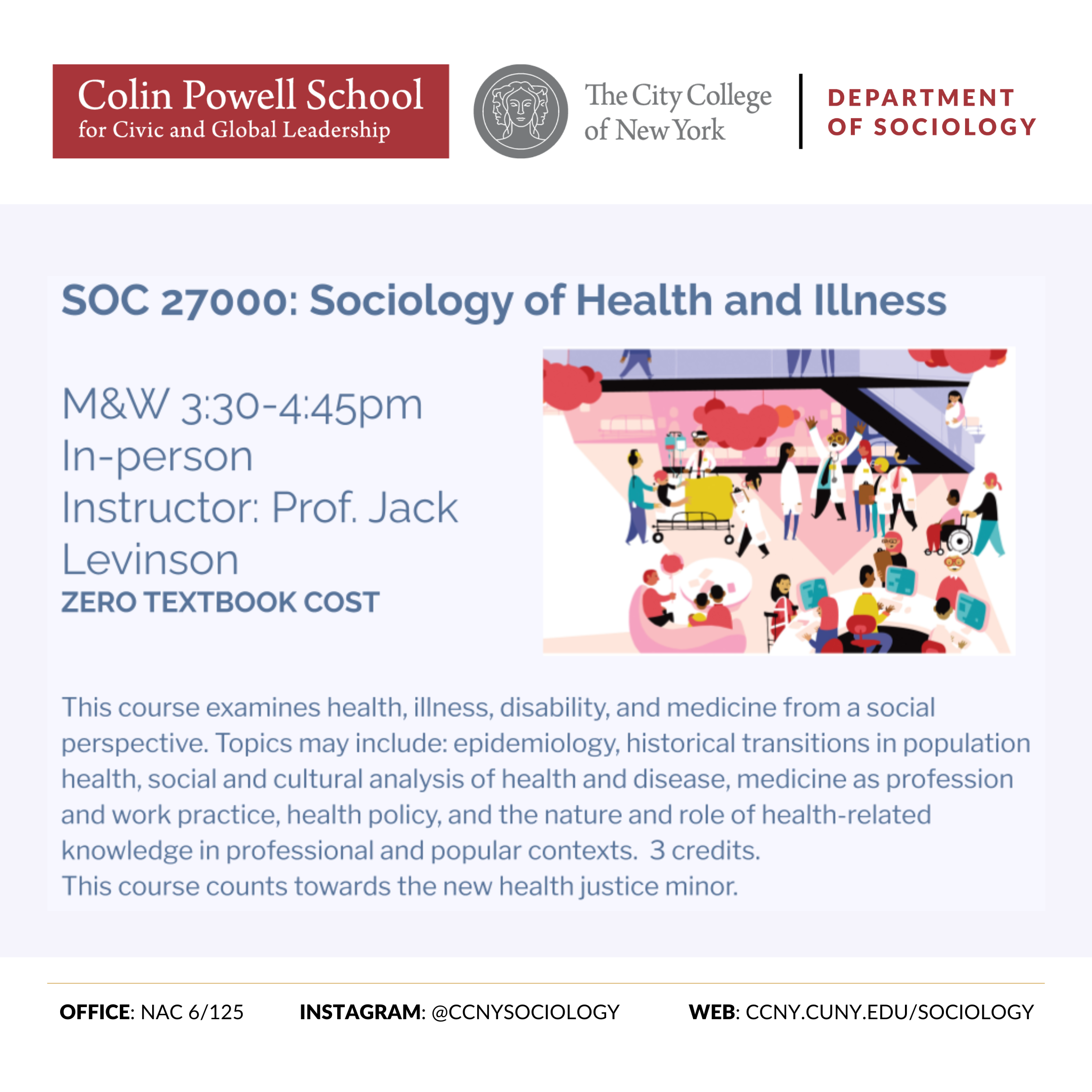
SOC 31163/PSY 31163: Child Welfare Systems: State Regulation and the Family (3 Credits)
T&Th 5:00-6:15pm
In-person
Instructor: Siobhan Pokorney, LCSW
This course is designed to provide students with a critical understanding of the role of state regulation on the lives of families, with a specific emphasis on child welfare, or family regulation, systems. Students will examine the strengths and weaknesses of social welfare policies impacting families through a lens of intersectionality. The course will provide space to envision alternative frameworks for raising children in safe and nurturing environments.
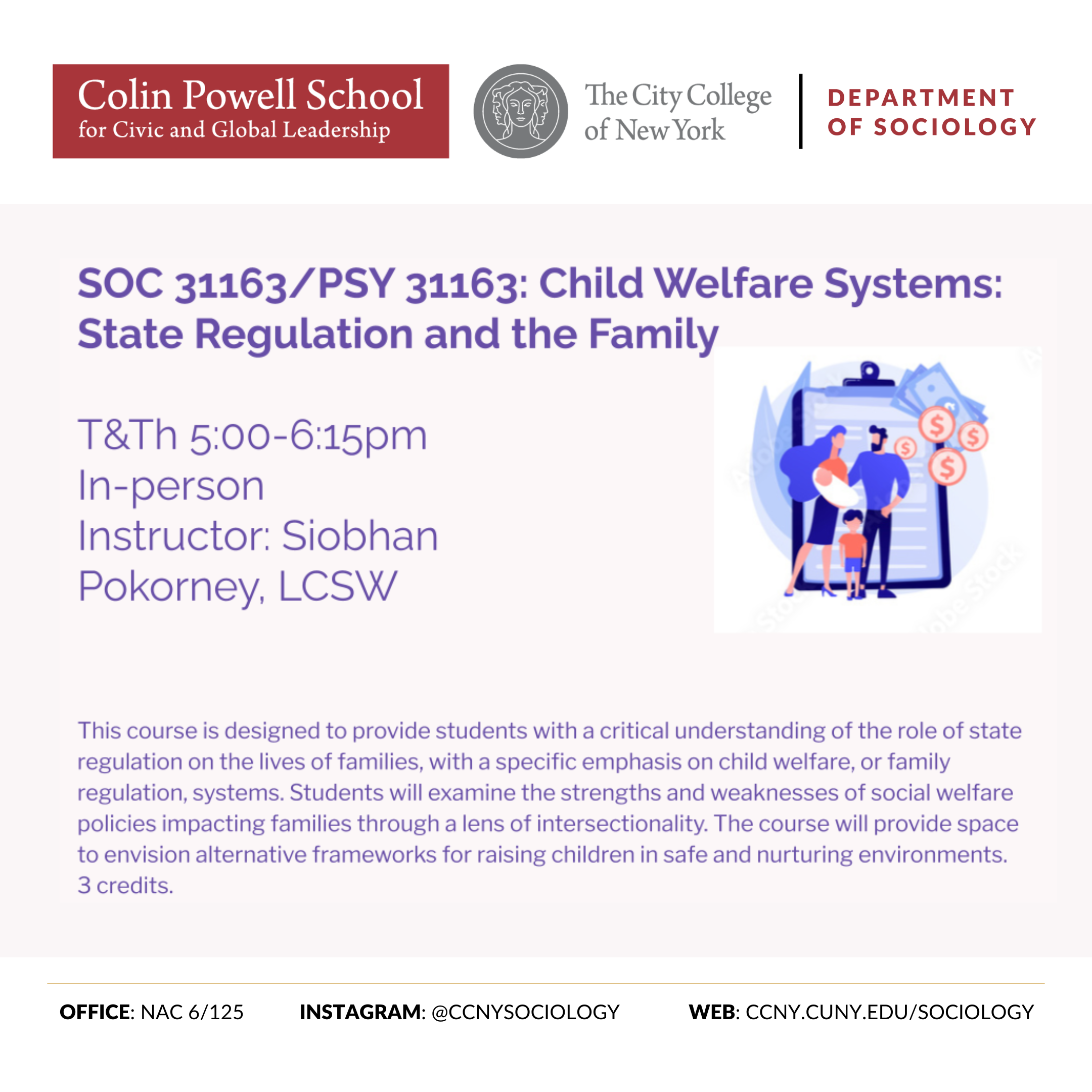
LALS 31132 / SOC 31132: Blancas, Negras, y Morenas: Gender & Race in Another America (3 Credits)
T&Th 3:30-4:45pm
In-person
Instructor: Prof. Norma Fuentes-Mayorga
The ideas that most immigrants import about their own ethnic or racial identity are often dissonant compared to those they experience or are given in the U.S. The experience often leads some immigrants and even their U.S.-born children to experience new forms of inequality and social dislocation. To understand the causes and consequences of race, ethnic, or even gendered identity formation, this course explores how a history of nationhood formation, miscegenation, and racial stratification in Latin America helps explain the pattern of inequality or lower life chances of Afro-descendants and indigenous minorities. We explore how legacies of colonization, slavery, and racialization in Latin America have affected the adoption of a mixed-race identity and variations in the spousing of racial identities among different national groups or even between men and women. Some questions guiding this course include: How does Latin America’s history of racial and ethnic census categorization differs or challenges the categories used by the U.S.? Why would skin color or phenotype convey different statuses and meanings in both national contexts? How does a racial or gender identity affect social mobility or even marriage choices, especially among highly educated Afro-Latinas or Indigenous women in LA or in the US? And how does migration complicate the social mobility process?
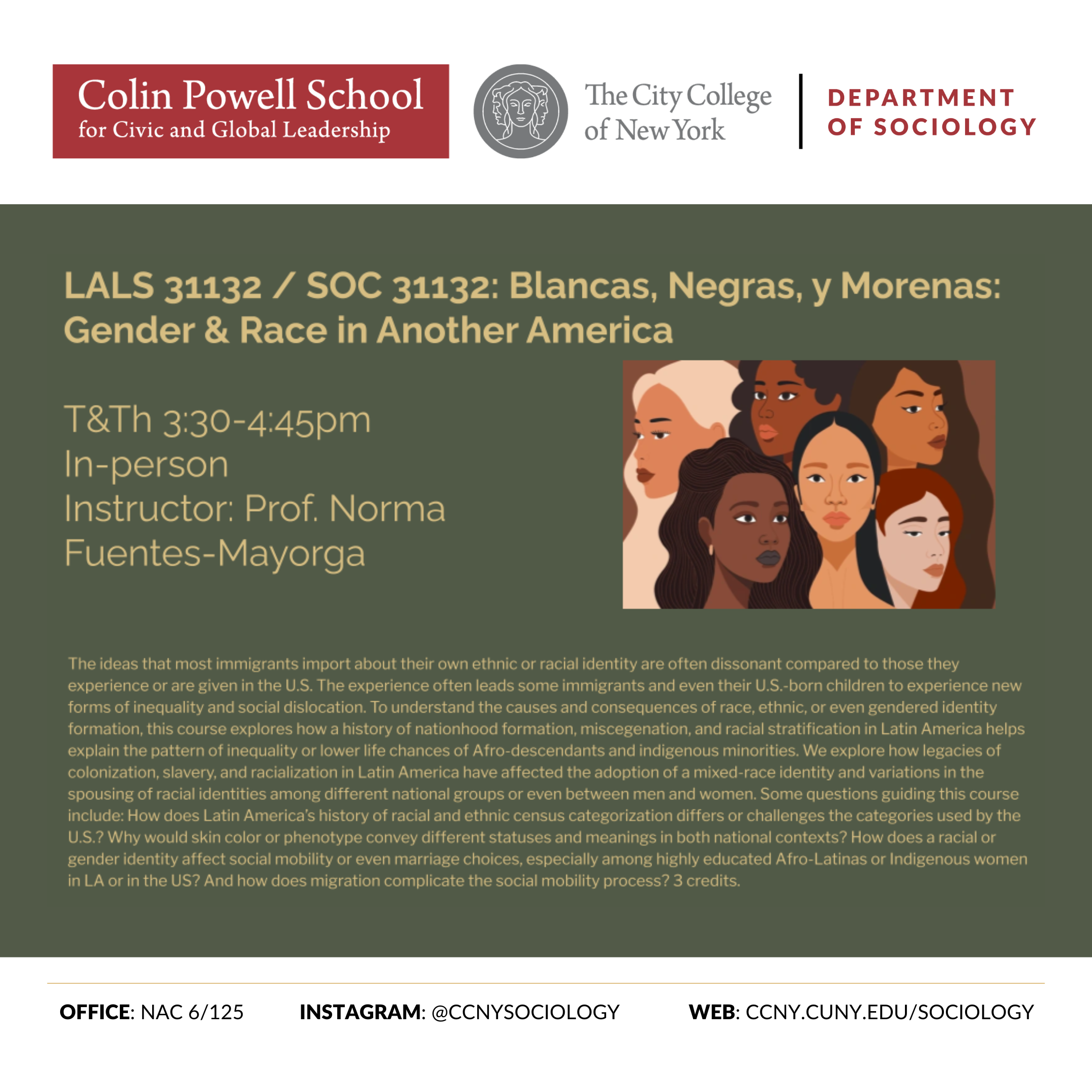
SOC 25400: Social Problems (3 Credits)
T&F 12:30-1:45pm
In-person
Instructor: Allison Goldberg
The origins and career of "social pathology" as a sensitizing concept. The interrelationship between social issues, and social problems, and public policy. The problem of bias in defining a social problem and in devising a strategy for meliorative intervention. Case studies with contemporary relevance. Role of voluntary agencies, mass media and legislative bodies in identifying social problems.
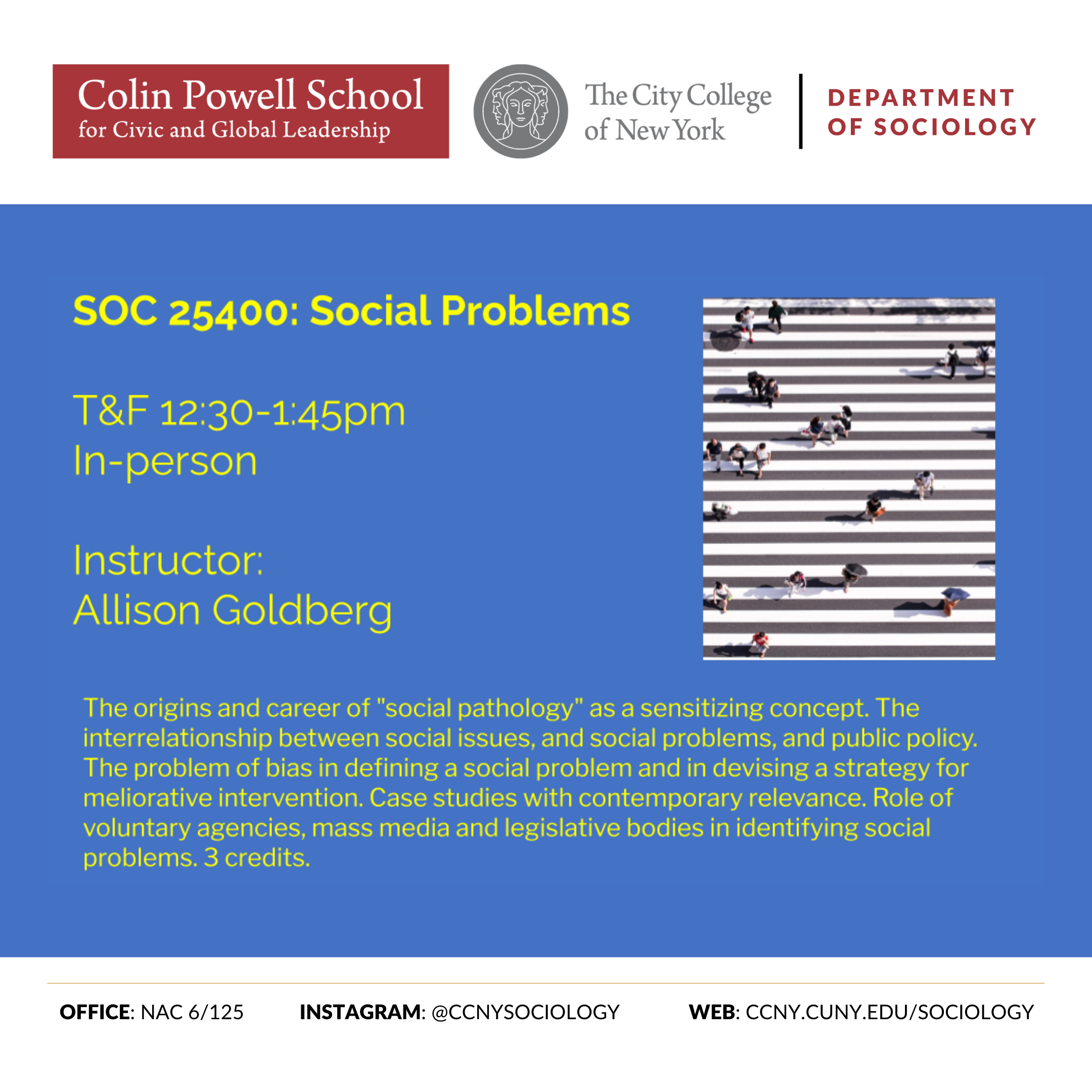
* THIS COURSE HAS BEEN CANCELLED
SOC 31138/INTL 31116: Gender and Work (3 Credits)
T&Th 3:30-4:45pm
IN-PERSON
Instructor: Chang Liu
**ZERO TEXTBOOK COST**
Why is some work considered to be women's vs. men's work? Why are so few business leaders women and/or persons of color? How can working fathers be encouraged to take on more parenting responsibilities? This course explores sociological explanations for such gender inequalities by examining gendered work, gendered division of labor, and the intersection of race and gender in labor markets. The course also covers feminist critiques and other perspectives on waged and unwaged work under capitalism in the U.S., with insights from countries in the Global South.
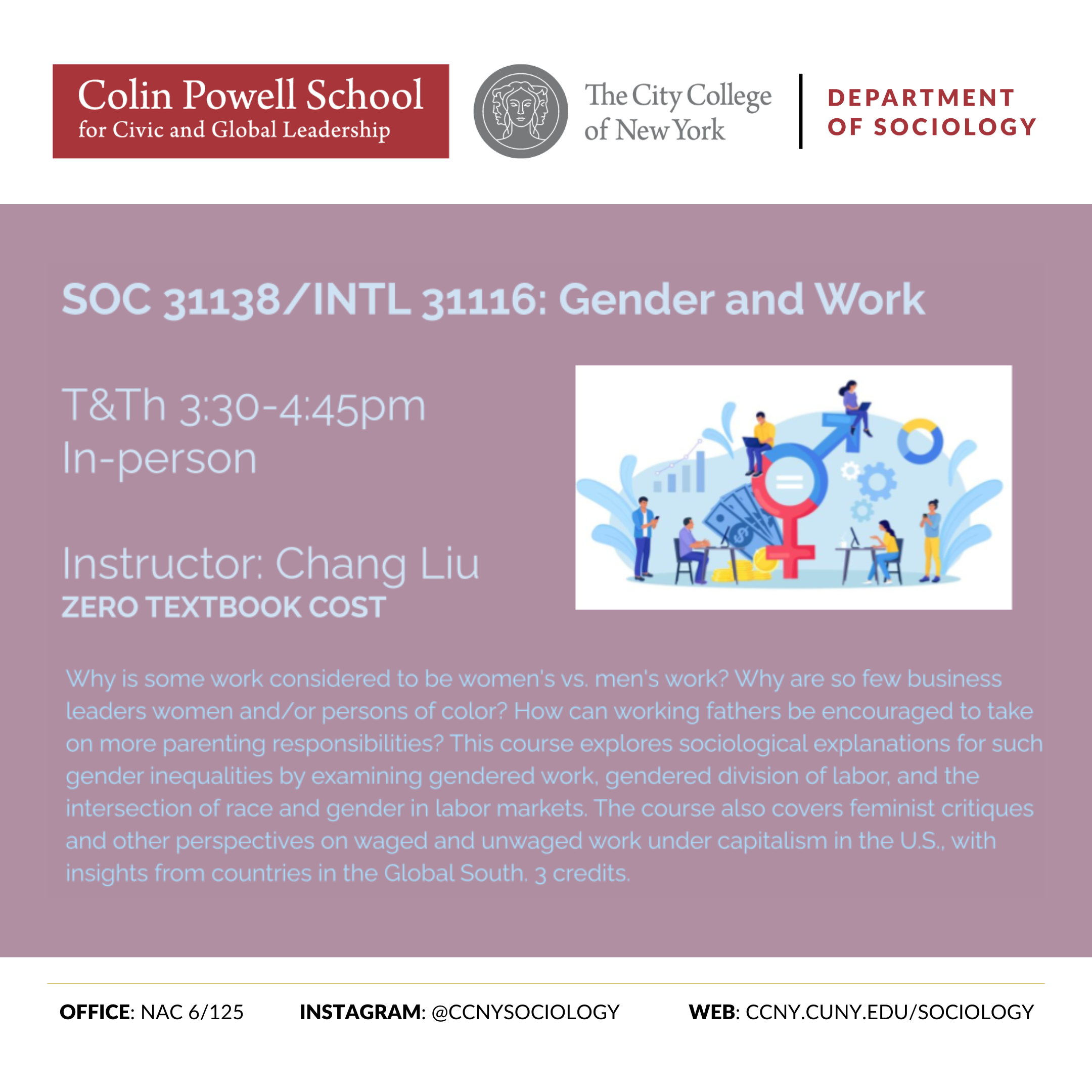
SOC 31165: Arts and Crafts and Social Movements (3 Credits)
T&Th 2:00-3:15pm
IN-PERSON
Instructor: Siobhan Pokorney, LCSW
Social movements have used a variety of techniques to spread their message and engage with the public -- including through arts and crafts. This course explores how social movements led by diverse actors, including enslaved people, incarcerated people, Indigenous people, unemployed people, and colonized people in the U.S. and around the world use arts and crafts to further their goals. This course will involve discussion, written journaling activities, and an extensive group hands-on creative component where students will communicate their own values and priorities through arts and crafts.
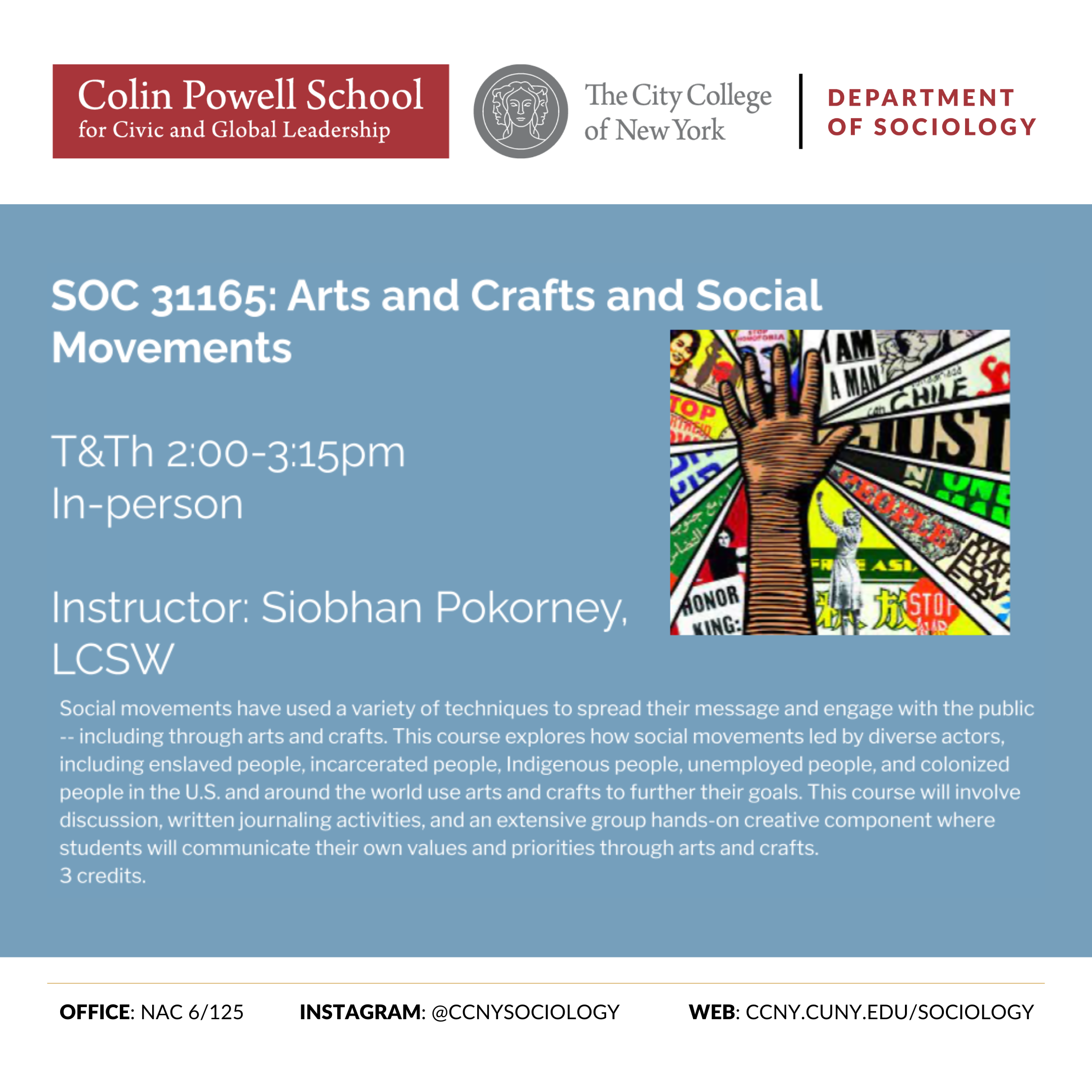
SOC 31184/BIO 31141 Health Equity: Biological and Social Determinants of Health (3 Credits)
T&Th 5:00-6:15pm
IN-PERSON
Instructors: Larry Au and Bao Vuong
**ZERO TEXTBOOK COST**
How do social structures and inequalities affect biological processes and human health? This course draws on perspectives in biology and sociology to examine how racism, genderism, economic inequality, the built environment, pollution, climate change, and other human activity affect stress, addiction, immune responses to infectious diseases and cancer, obesity, aging, genetics, and epigenetics. Students will also learn how government policies, industrial activity, or community activism can affect access to healthcare. Students will contribute to improved health equity by designing interventions that address biological and social determinants of adverse health.
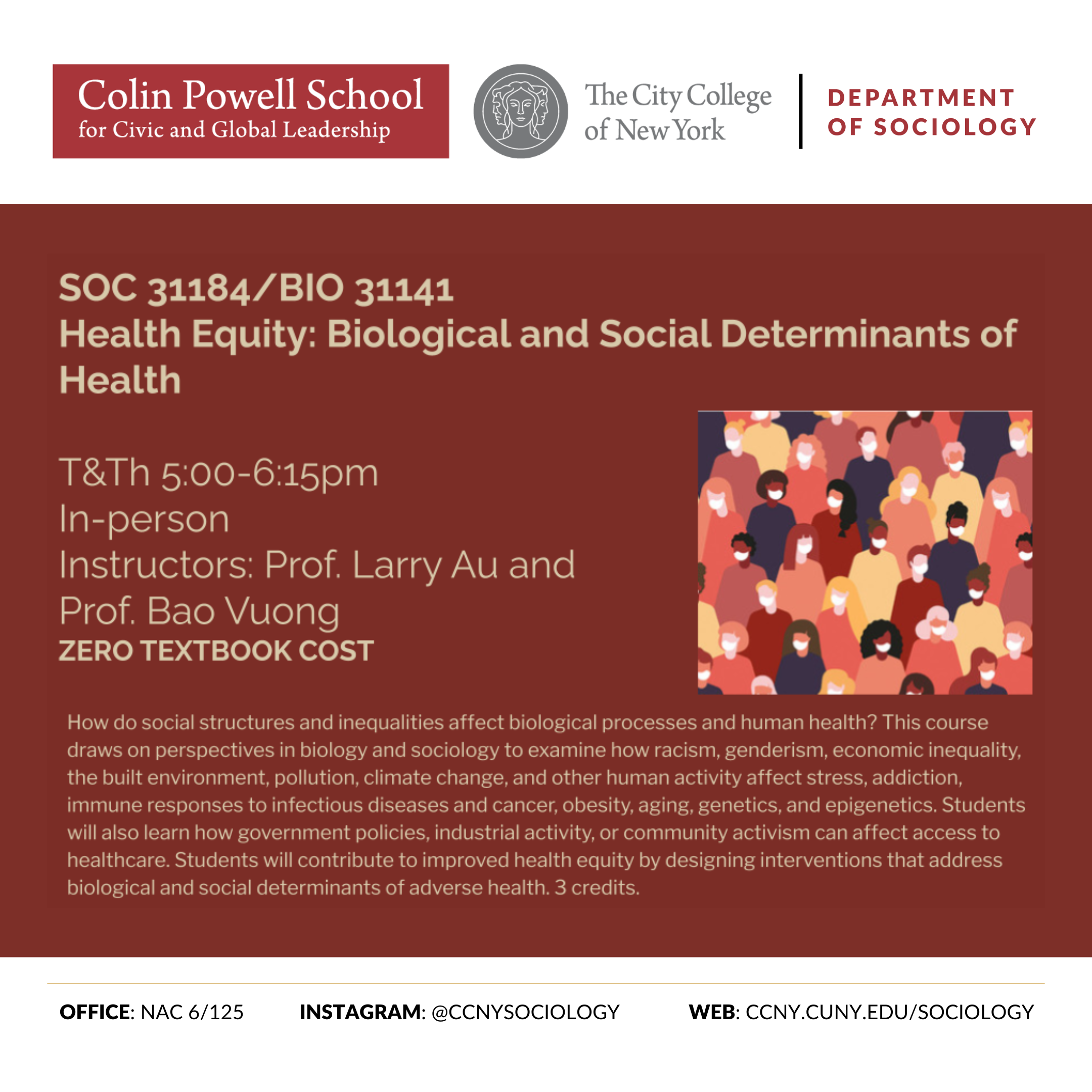
SOC 31188/LALS 31107: Latinas and U.S. Immigration (3 Credits)
T&Th 11:00am-12:15pm
IN-PERSON
Instructor: Prof. Norma Fuentes-Mayorga
This course explores the immigrant experiences of Latin America women in the US; specifically, the class, gendered and race-based vulnerabilities that push women to migrate to the U.S. We explore the factors that lead nations like Latin America to send mostly women while nations like Africa, India or even China, send mostly men. We start with an investigation of the role of globalization and that of an expanding service economy in the growing demand for women laborers by advanced nations like the U.S. and Europe. We examine the factors that push higher educated women to migrate, paradoxically, after joining the middle class and the contributions that they make with their cultural and monetary remittances to families left behind, especially children, and to institutions of the sending and receiving community. We conclude the course by addressing a few questions about the link between migration, development and inequality: Is the immigrant experience of women liberatory or oppressive? Are migrant women of color part of an increasingly feminized and racialized process of labor capitalism? Finally, how do developed nations like Mexico or the Dominican Republic cope with the loss of highly qualified citizens, especially educated mothers?
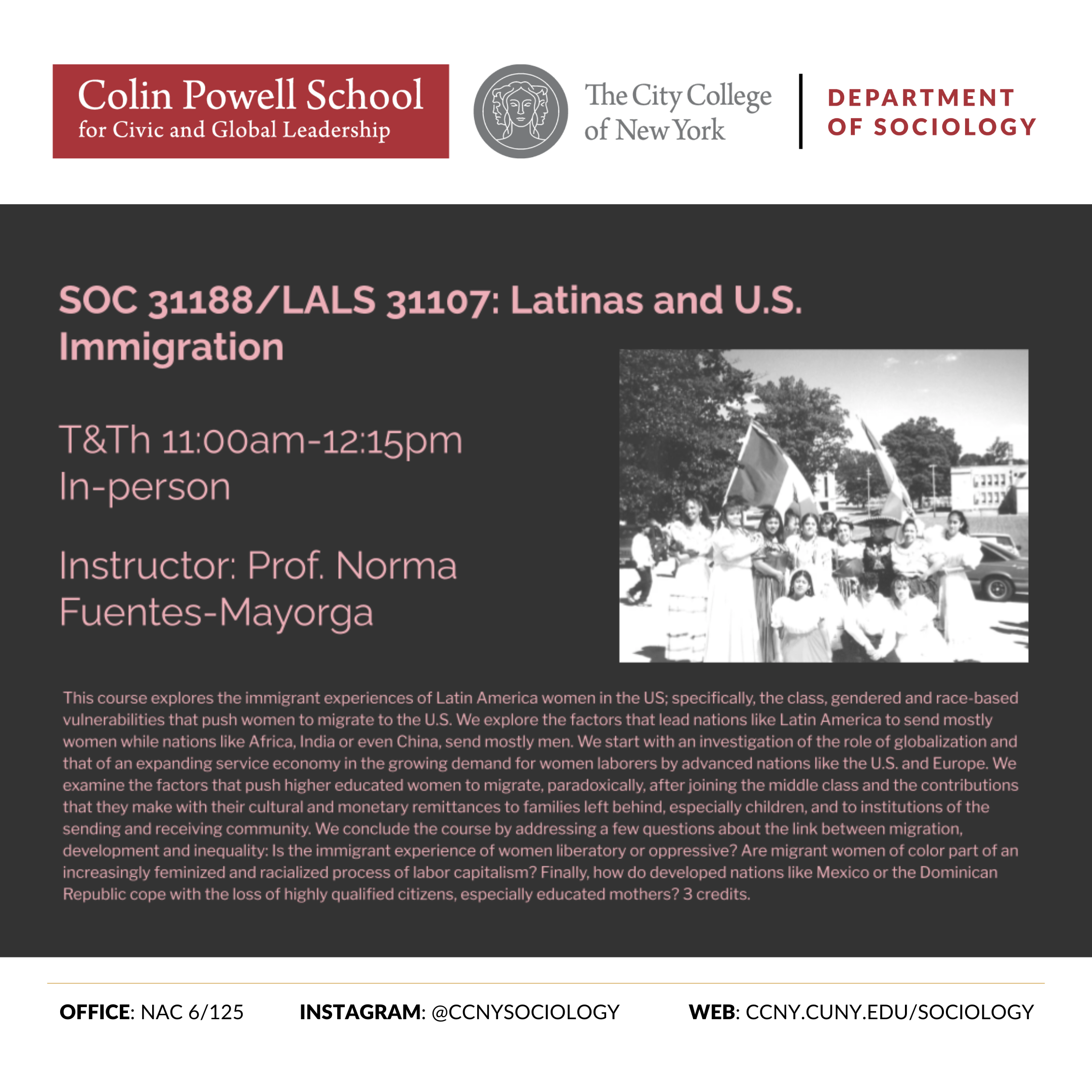
SOC 31197/PSY 311-87: Cults, Authoritarian and New Religious Movements: Charisma and Domination (3 Credits)
M&W 12:30-1:45pm
IN-PERSON
Instructor: Edward Silver, Ph.D.
Why do people join cults? Why are authoritarian leaders so compelling to so many people? How do "charismatic" leaders and collectives convince members to give up control over their lives, including their finances and intimate relationships? This course explores popular, self-help, religious, and political movements through the lenses of sociological and psychological theories. Working from specific case studies, we examine research on cults and authoritarian movements, and develop theoretical frameworks that will help us to understand the personal, structural, and emotional factors that draw people to such movements. Case studies include the Church of Scientology, the People's Temple, QAnon, and the Sullivanians, a psychoanalytic cult hiding in plain sight in Manhattan’s Upper West Side during the 1970s and 1980s.
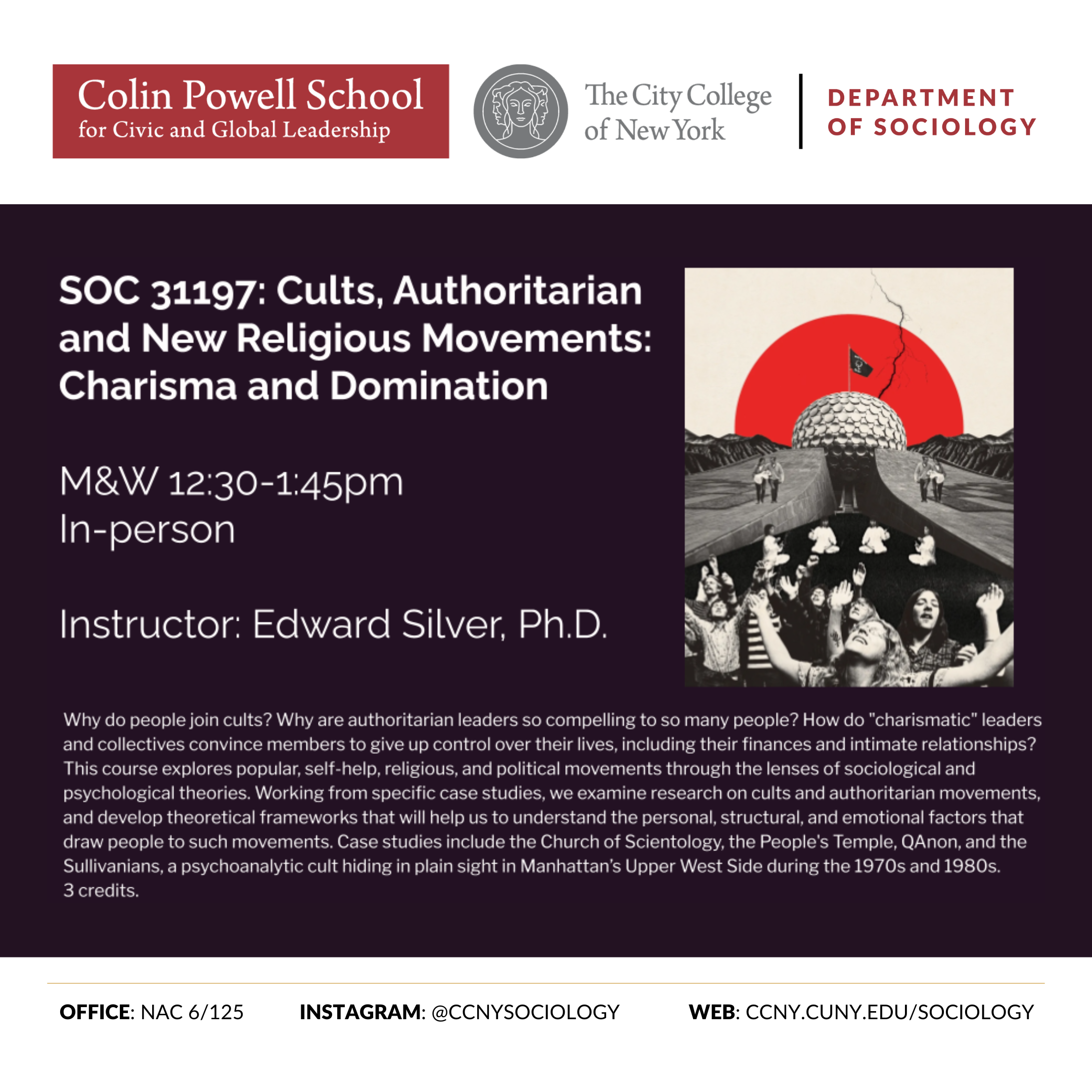
* THIS COURSE HAS BEEN CANCELLED
SOC 31359: Digital Sociology (3 Credits)
M&W 9:30am-10:45am
IN-PERSON
Instructor: Nicole Sarette
This course will explore sociological concepts from the perspective of our digital society. It will question how digital technology shapes our sense of self and our social relations in, for instance, social media, pop culture and access to modern conveniences. It will also examine the role of digital media in the creation and reproduction of social institutions, social structures, and inequalities. The course will consider the role of digital technologies in surveillance, privacy, and the embodiment of the self in society.
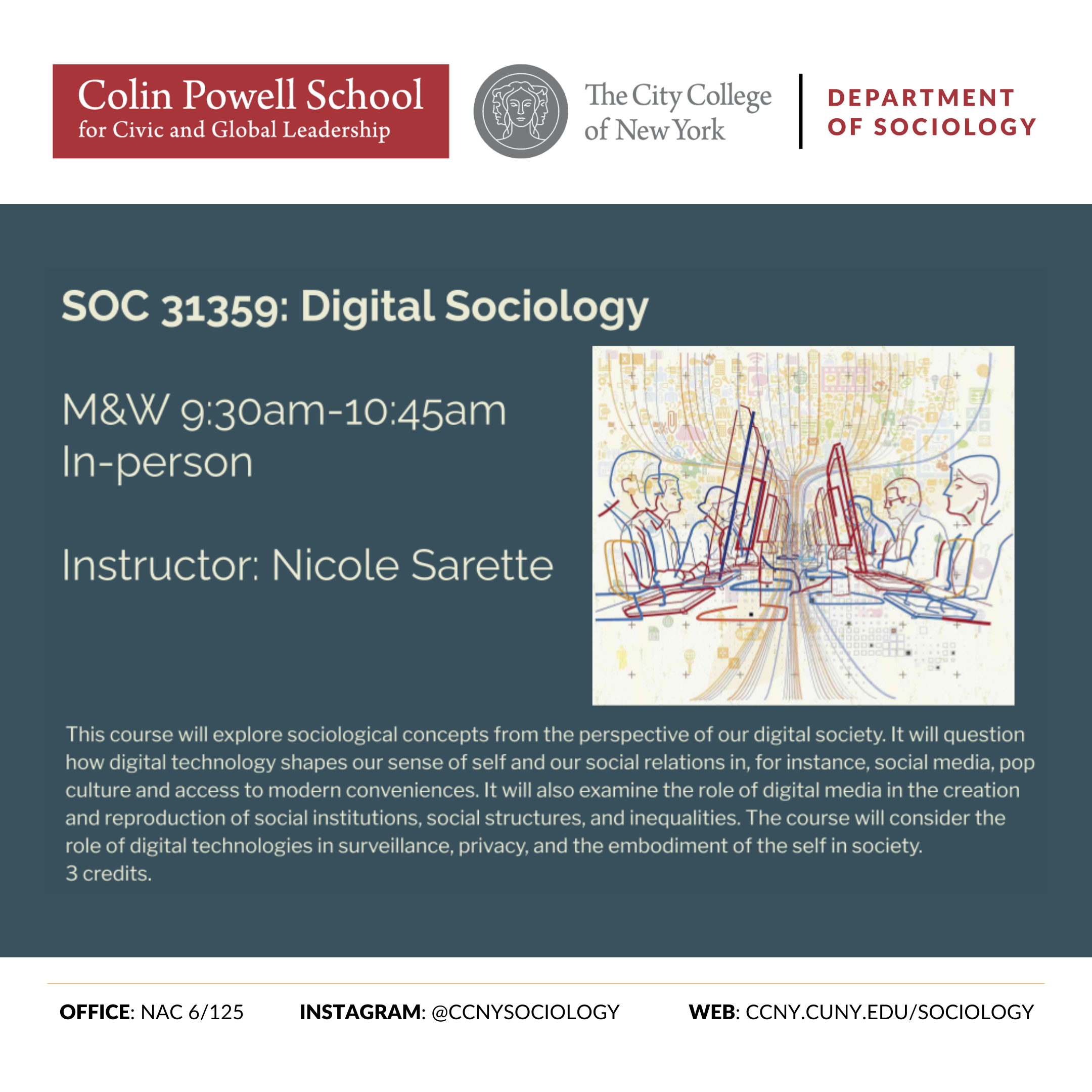
SOC 31996: Capitalism (3 Credits)
T&Th 3:30-4:45pm
IN-PERSON
Instructor: Prof. Ramona Hernandez
**ZERO TEXTBOOK COST**
This course will explore the origins and development of capitalism as a social system composed of vertical and horizontal class relationships, with an emphasis on the interrelationship between white supremacy and working-class organization. Readings will include seminal contributions from sociology, political science, labor history, and economics, e.g. Karl Marx, W.E.B. Du Bois, Francis Fox Piven, and Robert Brenner.
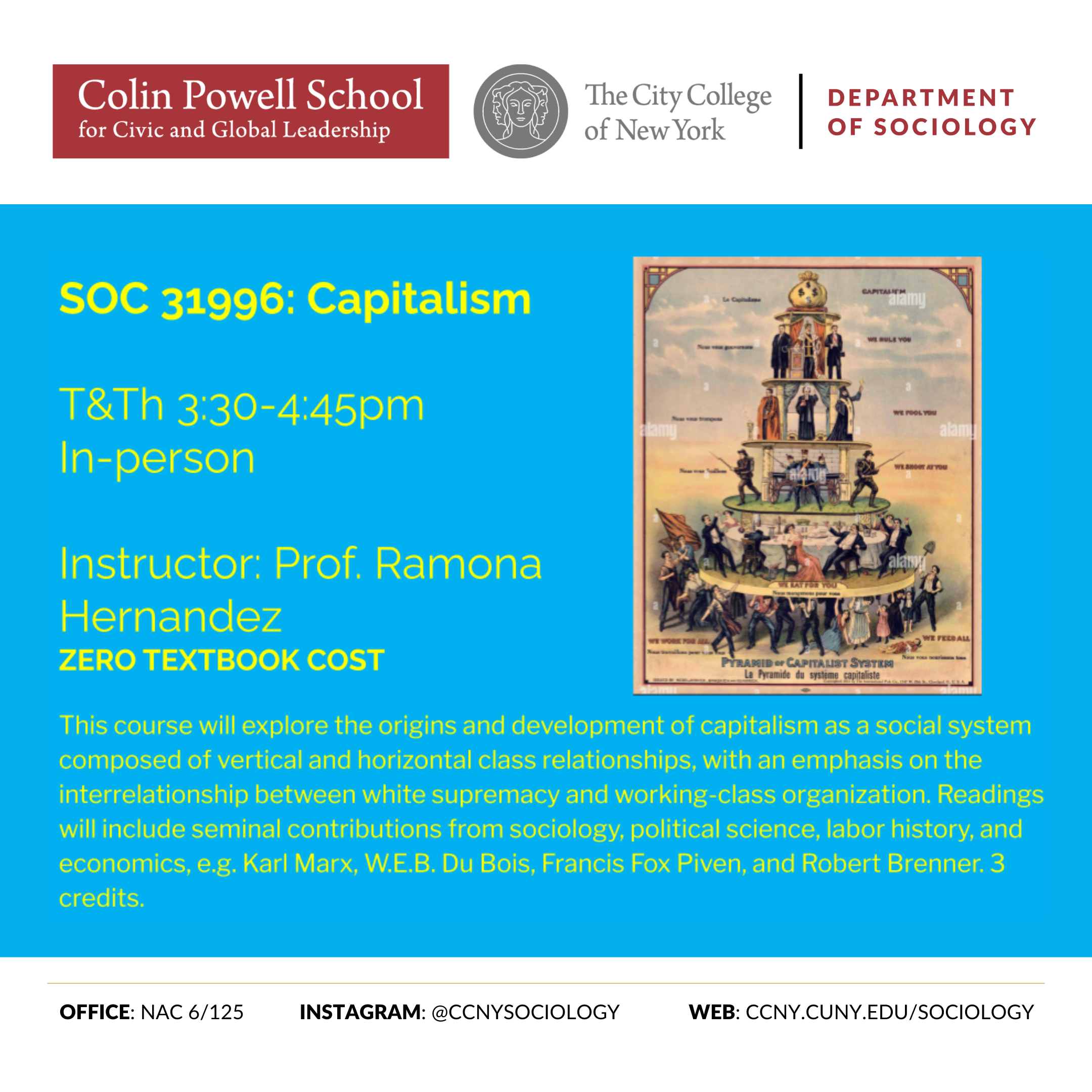
SOC 32100: Housing and Community Development (3 Credits)
M&W 2:00-3:15pm
IN-PERSON
Instructor: Prof. Yana Kucheva
**ZERO TEXTBOOK COST**
This course will introduce students to U.S. housing policy with a special emphasis on three substantive policy areas – affordability, social outcomes, and the creation of diverse communities. Students will learn about the symbolic significance of owning a home, the importance of homeownership for wealth accumulation, the history of providing housing for the poor, and the difficulties in setting housing policy across multiple scales (individual, neighborhood, city, region). The course will use both theoretical and empirical scholarship to explore the spatial and social segmentation of the U.S. housing market through topics such as segregation, gentrification, and the privatization of public space. In the process, students will gain a greater appreciation for the social, economic, and political structures of American society, the successes and failures of U.S. housing policies, and the link between housing policy and community development. The class will include a critical assessment of the role of housing in the U.S. economy and provide possible policy solutions to creating inclusive communities through housing policy.
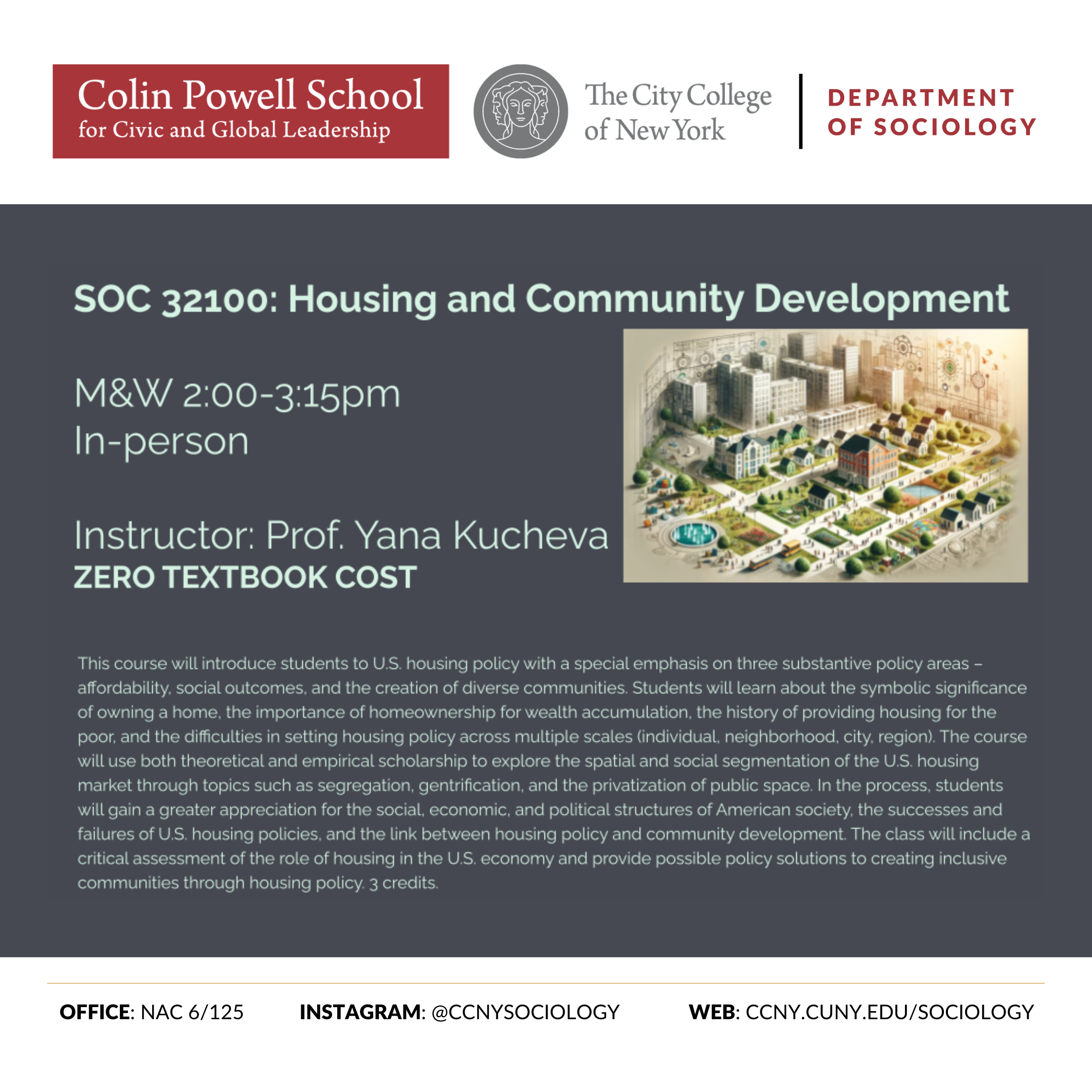
SOC 32604/LALS 31304: Power, Resistance, and Popular Protest: Social Movements in Latin America (3 Credits)
M&W 9:30-10:45am
IN-PERSON
Instructor: Carlos Encina Oleart, Ph.D.
This course explores several key social movements that during the last decades have shocked the political, economic, and social foundations of countries such as Argentina, Bolivia, Brazil, Chile, and Mexico. Using social movements theories, this course delves into the roots, development, and implications of popular mobilization to resist neoliberalism and global capitalism.
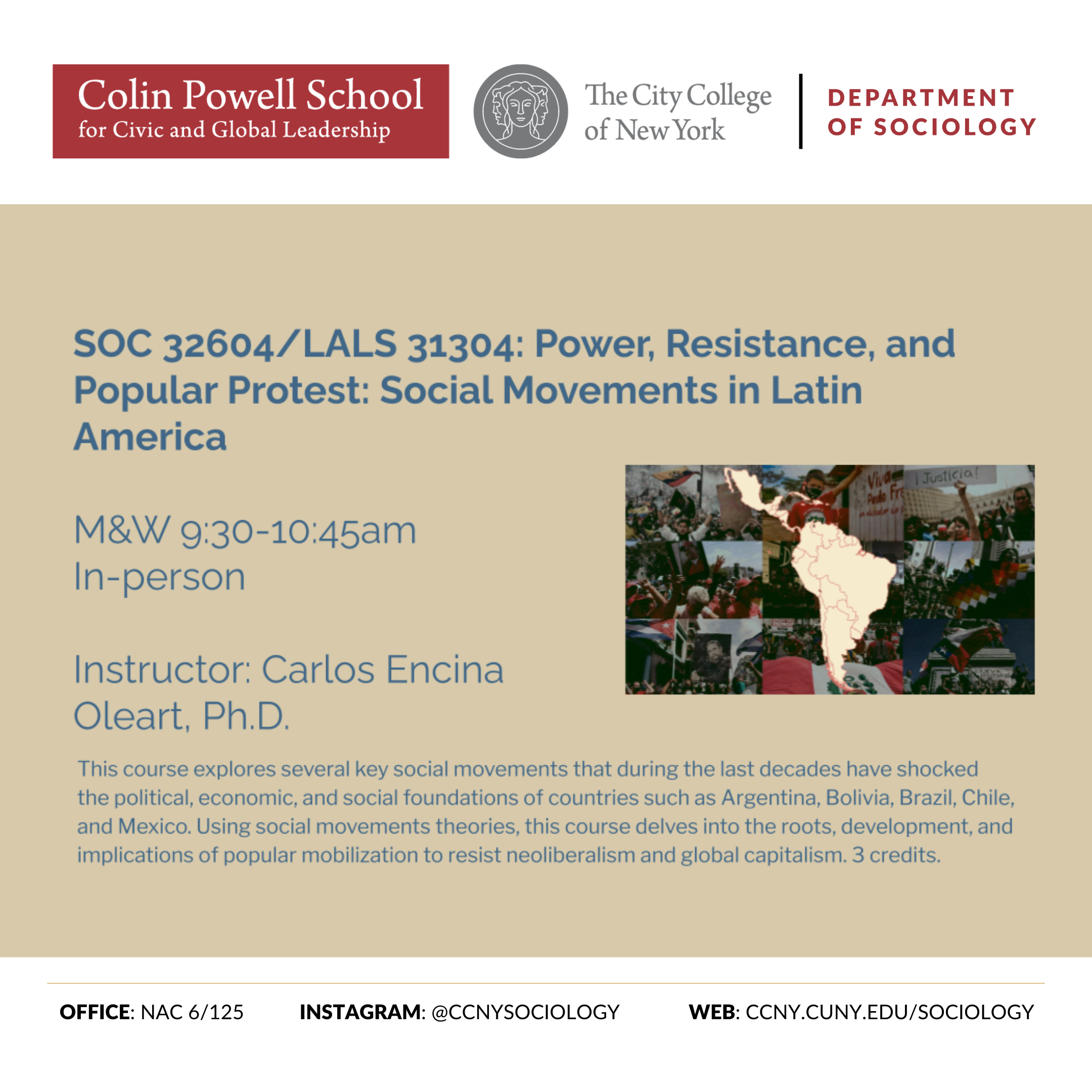
SOC 32605/PSY 31912: Trauma and Resiliency in Society (3 Credits)
T&Th 6:30-7:45pm
IN-PERSON
Instructor: Siobhan Pokorney, LCSW
This course offers a sociological investigation of trauma and resiliency within an individual's identity, an individual's neurobiology, and at the collective socio-cultural level. Class discussions will include topics related to the support and psychiatric care of survivors of interpersonal violence, community-level violence, and sociopolitical violence. Specific attention will be paid to Black, Indigenous, and Communities of Color, with the aims of reducing the impact of trauma on individuals and society.
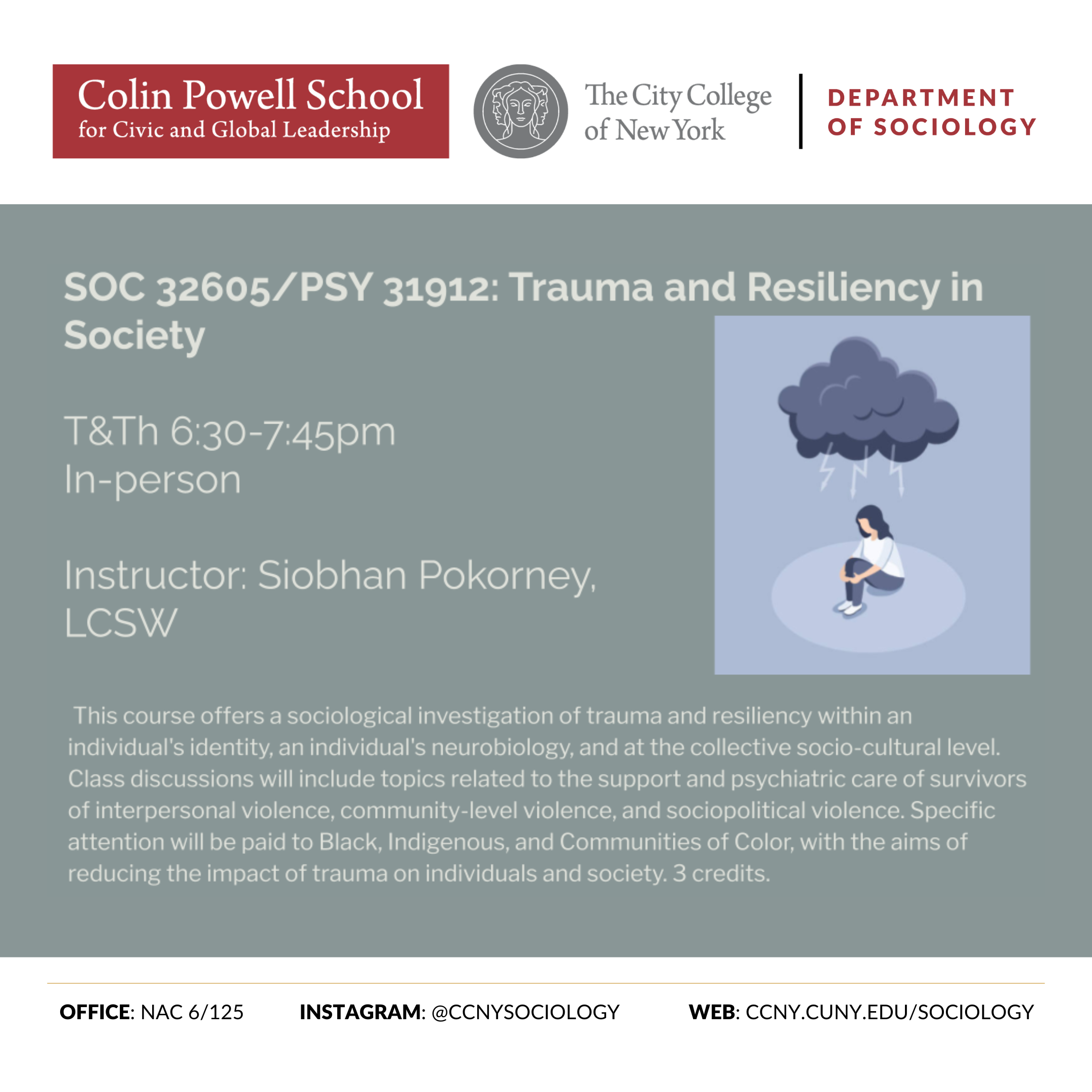
SOC 34100/PSY 31410: Disability Studies (3 Credits)
M&W 2:00-3:15pm
In-person
Instructor: Prof. Jack Levinson
**ZERO TEXTBOOK COST**
Surveys this transformative interdisciplinary field, informed by critical approaches to race, gender and sexuality, which offers an approach to disability as a social, political, and cultural category and a personal identity and lived experience. Readings include current and historical material, theoretical and empirical, from the social sciences, humanities, and arts.
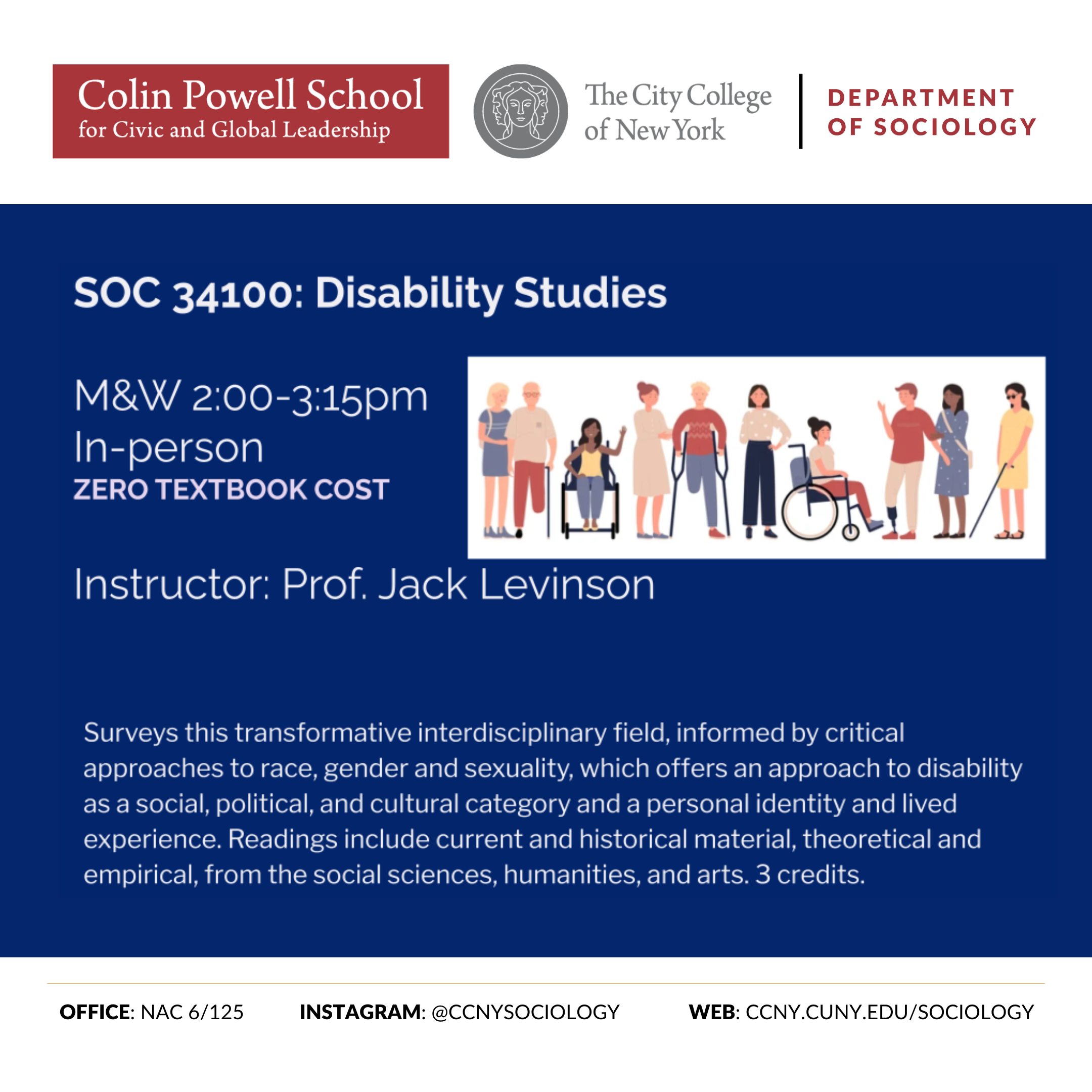
* THIS COURSE HAS BEEN CANCELLED
SOC 34200/INTL 31123: Globalization (3 Credits)
T&Th 11:00am-12:15pm
IN-PERSON
Instructor: James Biles
Focusing on globalization as a set of social, economic, cultural and political processes as well as discourse, this course reveals how the profound societal changes of the past 50 years are associated with far-reaching technological innovations, as well as a "radical" shift in thinking about the roles of government, corporations and civil society. As such, the course highlights both the benefits of globalization and some of the shortcomings of the prevailing discourse promoting increasing global integration.
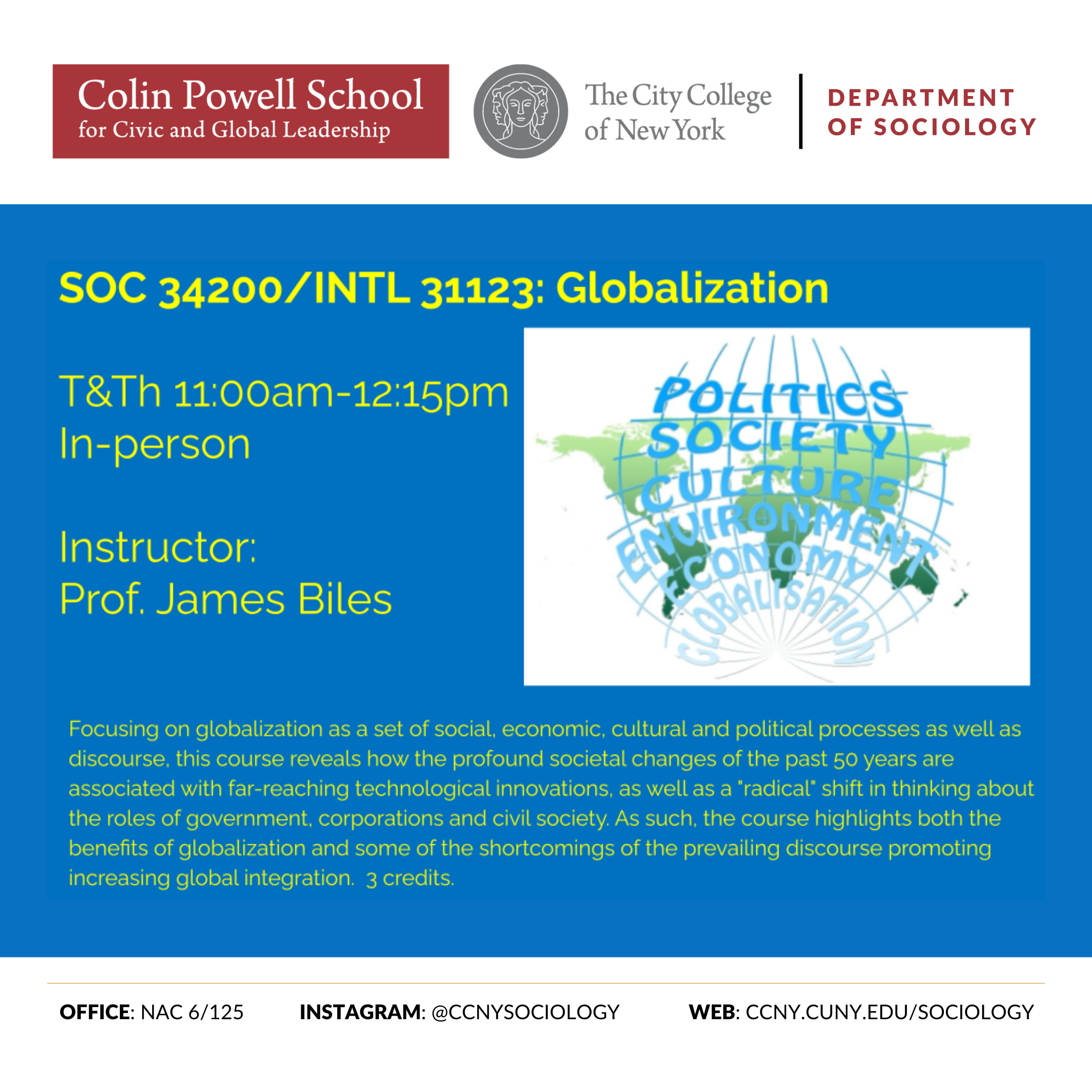
SOC 34300/BLST 31167: Sociology of African American Experience (3 Credits)
M&W 12:30-1:45pm
IN-PERSON
Instructor: Colin Ashley
Provides a deep understanding of the ways that African-Americans have been the object of sociological study and producers of sociological knowledge. By exploring historical and contemporary phenomena, students will develop a critical understanding of the social location of African-Americans in employment, education, residence, culture, politics and other areas of society.
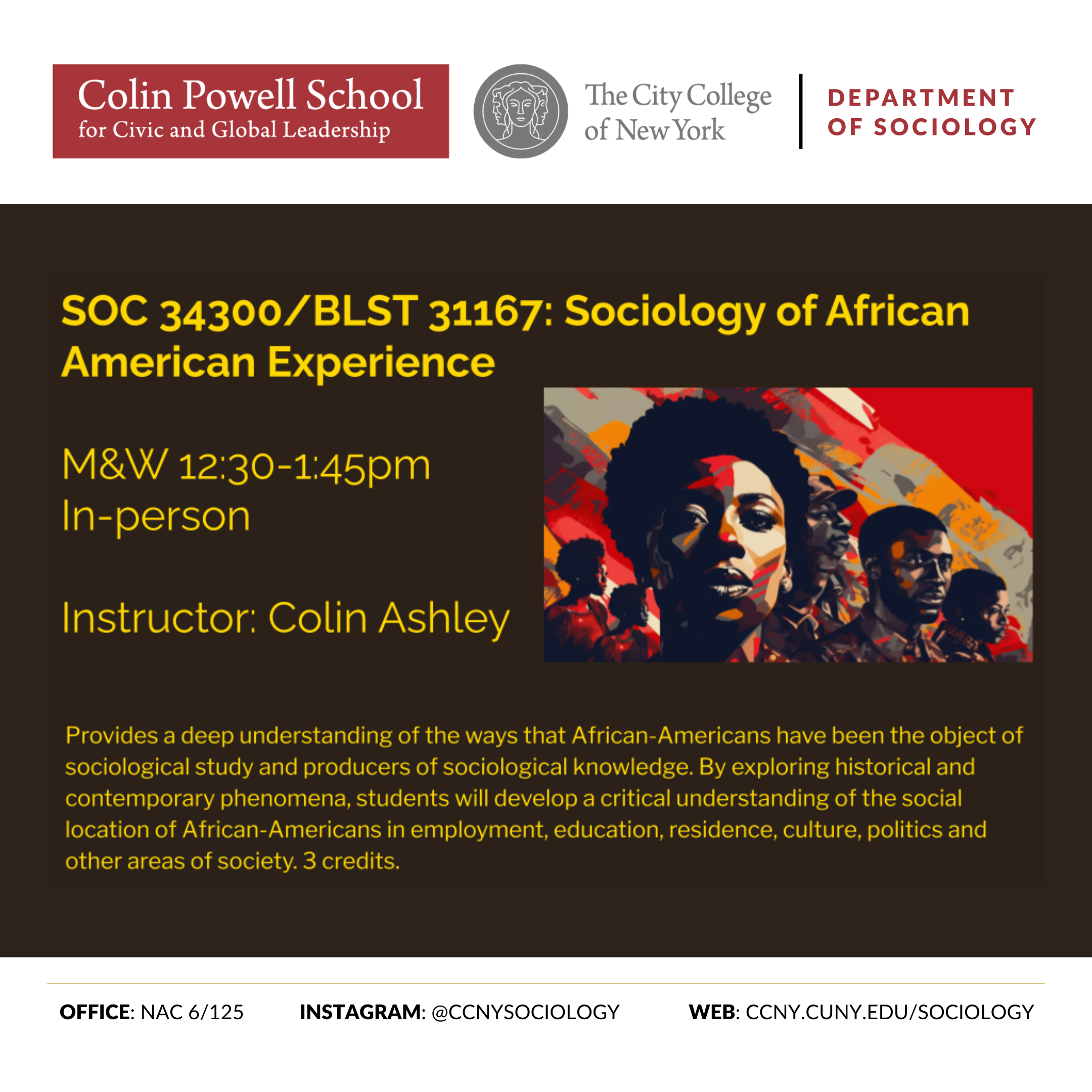
SOC 38102: Work and Family (3 Credits)
M&W 10:00am-12:15pm
IN-PERSON
Instructor: Nicole Sarette
Sociological analysis of how work and family can affect life chances, reinforce gender roles and cultural stereotypes, and widen inequality. Examines how public policy and workplace practices can affect individuals' experiences with work and family.
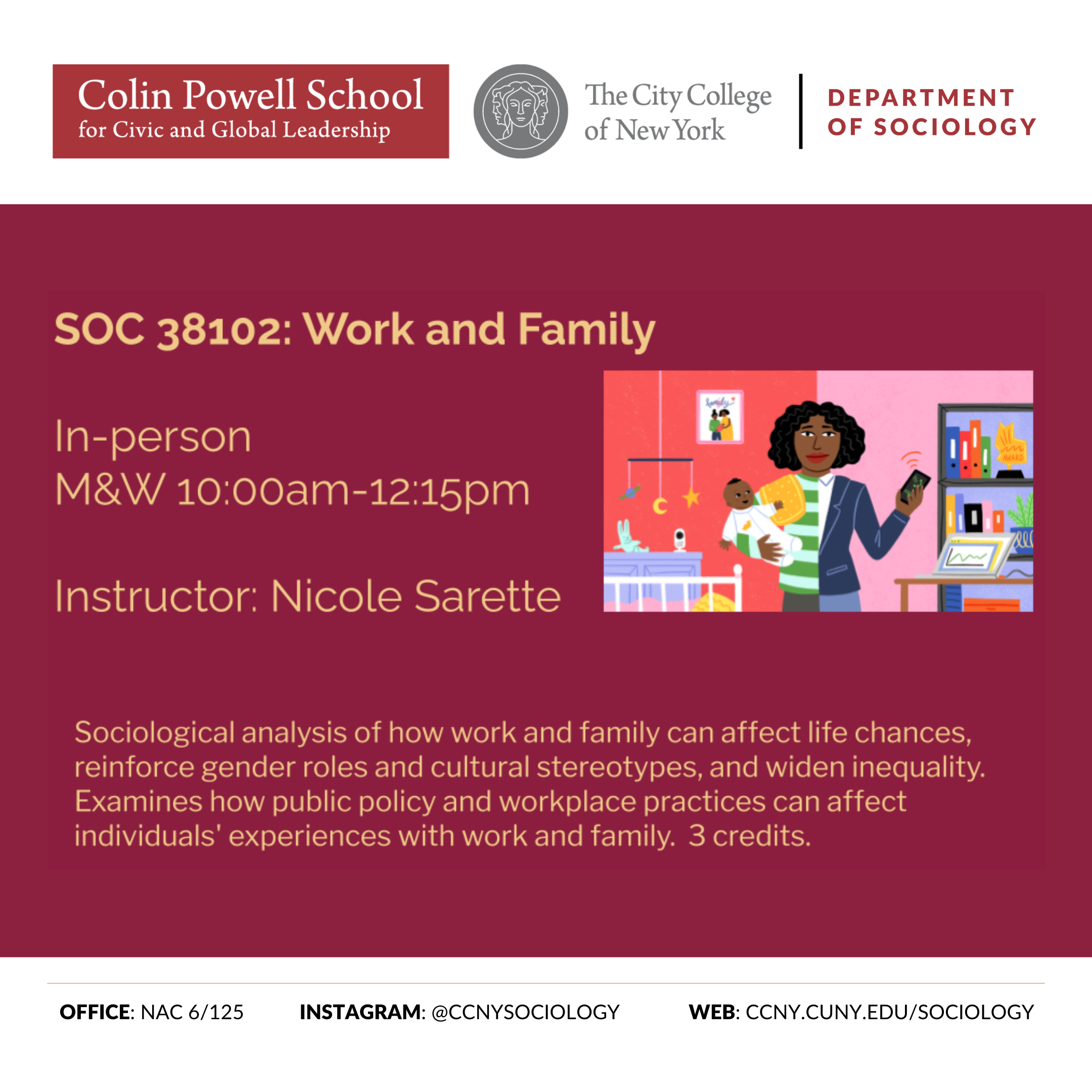
SOC 31198: Love and Relationships (3 Credits)
M&W 3:30-4:45pm
IN-PERSON
Instructor: Justin Beauchamp
**ZERO TEXTBOOK COST**
How do social norms and cultural expectations about gender, sexuality, family, and marriage shape how we think about love and relationships in contemporary societies? This course simultaneously deconstructs and reconstructs our understanding of love and relationships ? from romantic, to platonic, to familial, to sexual, and other intimate connections ? using a sociological lens. We explore themes ranging from what love is and what love should be, to how normative and non-normative relationship structures (e.g. monoamory, polyamory, relationship anarchy, etc.) have changed, to what kinds of relationships (e.g. romantic partnership, friendship, situationships, marriage, chosen family, etc.) institutions recognize and support.
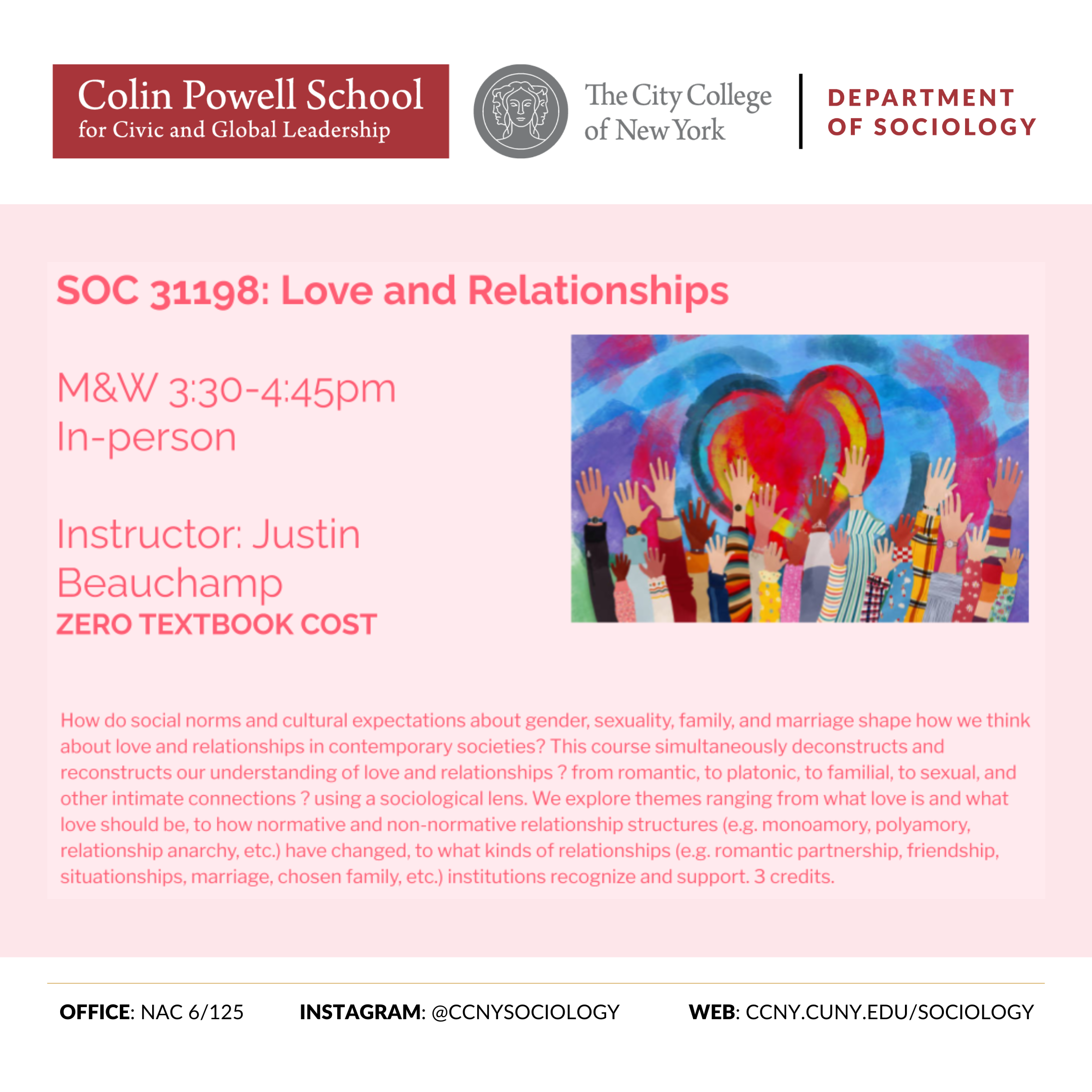
SOC 38103/INTL31113: Race and Ethnicity in International Perspective (3 Credits)
T&Th 2:00-3:15pm
IN-PERSON
Instructor: Jennifer Sloan
Race and ethnicity are key dimensions of stratification in society. This course examines competing theories and definitions of race and ethnicity. Using case studies, it looks at the social construction of race and ethnicity in different societies around the world during different eras. This is an upper-level elective that is reading and writing intensive.
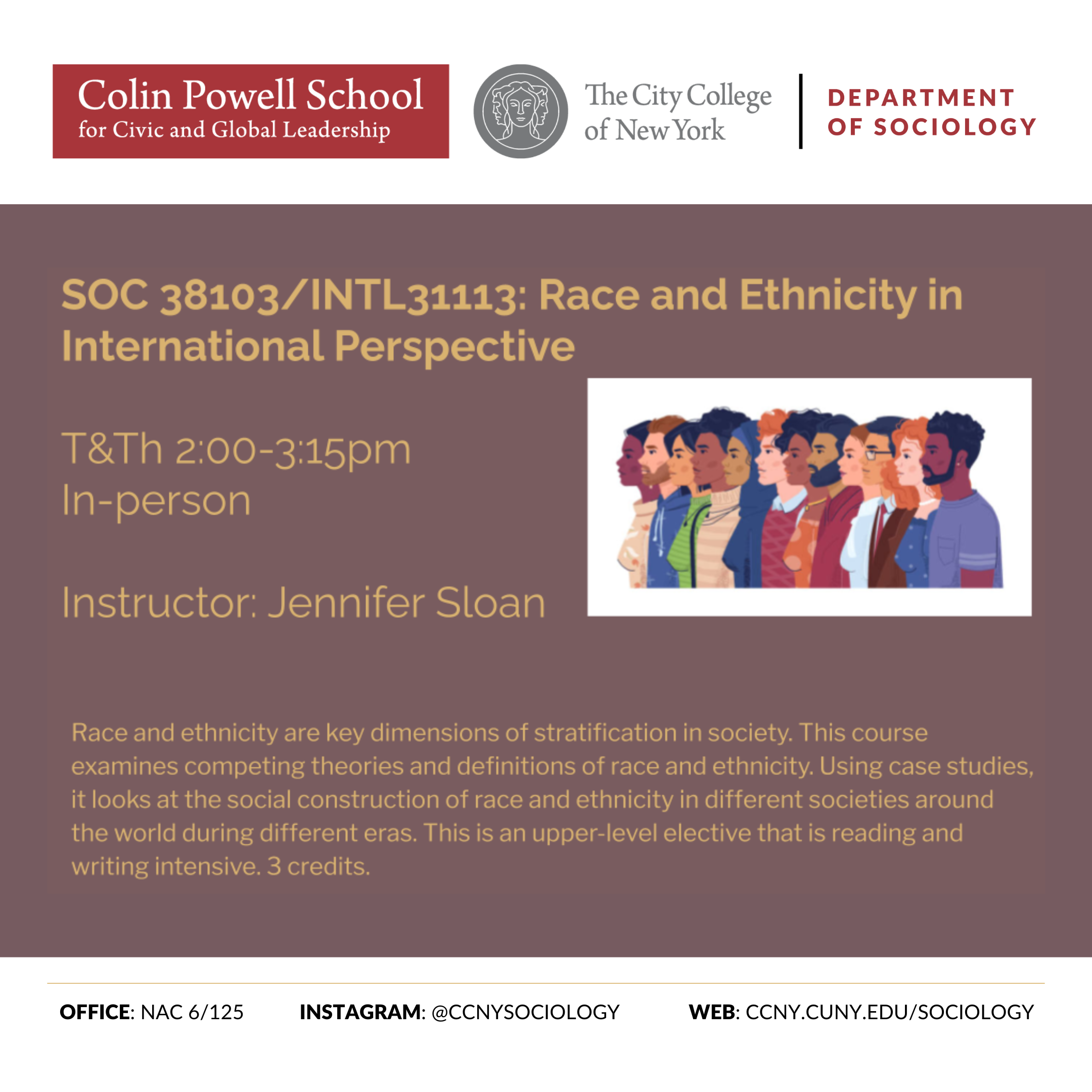
SOC 38107: Justice, Law, and Society (3 Credits)
M&W 6:30-7:45pm
IN-PERSON
Instructor: Ian Heller, JD
This course looks at theories about law, the practical application of law in the justice system, and peoples' own perceptions of the law. It explores how those aspects of law often differ from one another and considers the implications of those gaps in understanding. Typically one term paper of 12-15 pages. Two essay exams and one oral classroom presentation.
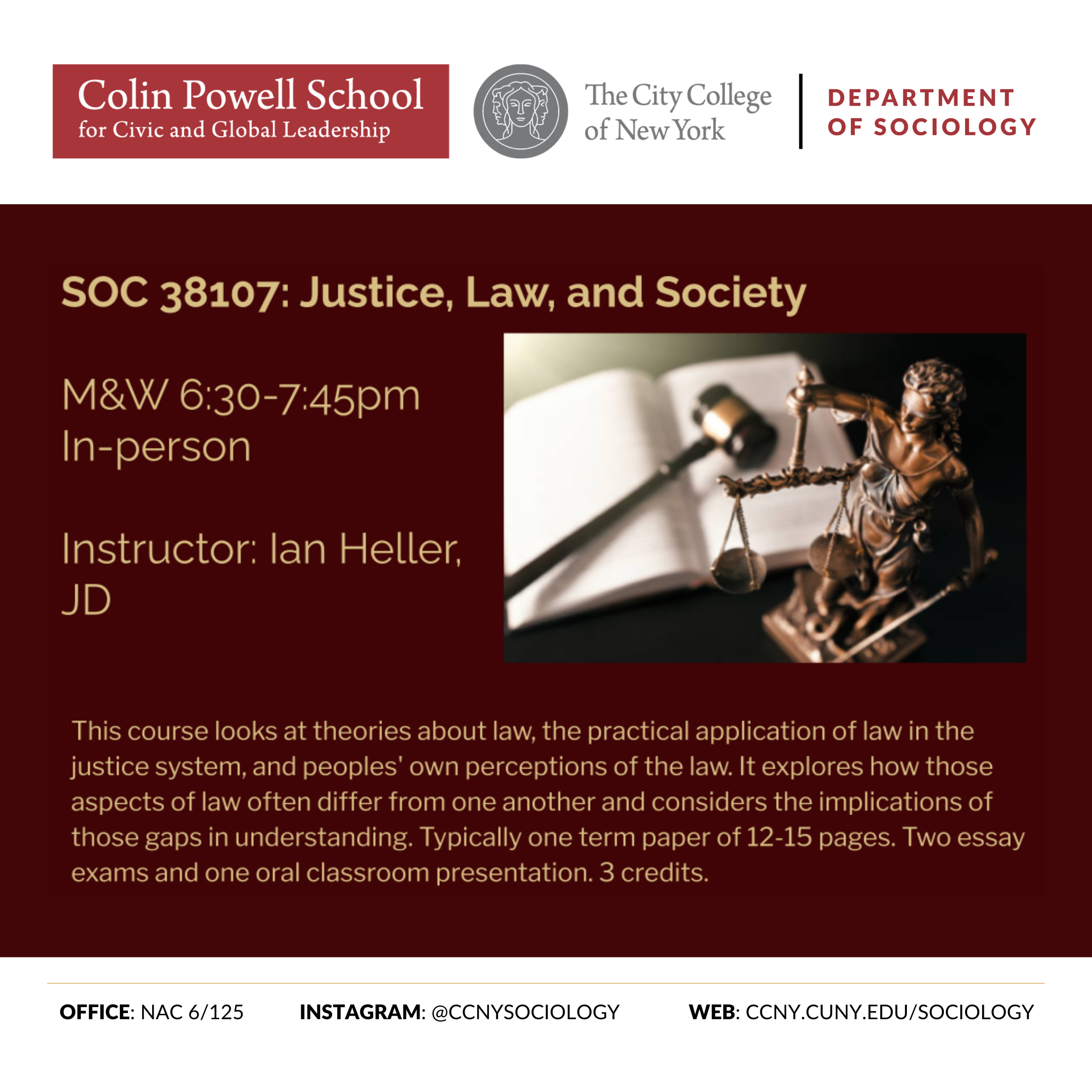
SOC 38209: Sociology of Sexualities (3 Credits)
M&W 5:00-6:15pm
IN-PERSON
Instructor: Nicole Sarette
**ZERO TEXTBOOK COST**
Drawing upon sociological, feminist, queer, and disability theories, this course examines the conceptualization, reproduction, and stratification of sexualities in different historical and cultural contexts; We explore how interactions among ideological, racial, religious interests have created normative systems of sexual classification that justify not only disciplinary systems of punishments and rewards, but also unequally distributed power among those who conform, innovate, or deviate from norms.

Last Updated: 02/19/2025 00:14